
The Latest News and Views about ANTINOUS the GAY GOD
Compiled and Updated
By
Hernestus, Priest of Antinous

The Memoirs of an Ancient Priest of Antinous (NEW)
DECEMBER 21st 2011

The Latest News and Views about ANTINOUS the GAY GOD
Compiled and Updated
By
Hernestus, Priest of Antinous

The Memoirs of an Ancient Priest of Antinous (NEW)

On this date, the Religion of Antinous commemorates the magical day in the year 128 AD when Antinous and Hadrian visited the Oracle of Delphi. Hadrian and Antinous entered Delphi at the magical time when Dionysus was the supreme deity of the shrine. They solemnly advanced in procession up the sacred way, and entered the Temple of Apollo.
The Oracle may not have been in consultation, and there is no evidence of Antinous or Hadrian receiving her words. Antinous was further instructed in the mysteries of Orpheus by his priests who were a religious order devoted to Dionysus, and limited to men.
Having been initiated in Athens into the dark mysteries that Orpheus revealed of death and resurrection, Antinous was here shown the high Orphic Secrets of Creation. The meaning of the egg of the dark bird of Night was infused into the deepening abyss the mystery of Antinous during this visit, and the full brilliance of Antinous Invictus was ignited as Phanes-Beauty, Eros-Love, and Zagreus-Ecstasy were awakened within him.
Could he have foreseen that one day the Sacred Religion of Antinous would span the globe? Check out the nearly 500 members of the brotherhood of worshipers of Antinous which we call ECCLESIA ANTINOI and you see there are people in the UK and the US and Canada. There are people in Sao Paulo and Sydney. There are people in California and Cape Town, and there are some in Portland Oregon and Portland Maine.
For some of us the December Solstice means the days are getting shorter and Winter is approaching. For others of us the days are getting longer and Summer is on the way.
For our brothers in Brazil and South Africa and Australia, the jacarandas are in bloom and the days are hot and balmy. Sydneysiders are bracing for another bush fire season.
For our brothers here in Britain and Europe (where I live), the days are short and almost completely sunless and the scent of roasted chestnuts and mulled wine fills the air from vendors on city streets.
Wherever we are, regardless of the season, Antinous the Gay God looks into our hearts.
And it is all happening at this magical moment. Twice a year there is a moment — today in fact — when the sun seems to "stand still" in the heavens. From the Latin "sol stasis" we derive our name for these events: solstices.
That's the very odd thing about this blue marble upon which we live. The Solstice occurs at the same moment everywhere. But the hands on the clocks point to 23 different hours. And in some places it signals the start of summer (though the days start getting shorter), while in others the it signals the start of winter (though the days start getting longer).
But it is really the same moment and we are all living and breathing at this same moment, though we live in places where the hands of the clock point in all different directions. Each of us is alone. All of us are together in this aloneness.
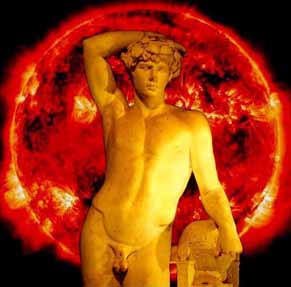
It is the moment of Antinous-Narcissus. And this is the cue for Flamen Antinoalis Antonyus Subia to wax eloquent about the Antinous Mystery Teachings revolving about the phenomenon of the December Solstice. It is the Three-Fold Mystery Teaching about how the Lone One begets the Three-Fold Divinity:
"The return of the sun is the Conquest of Unconquered Light over chaos and darkness, the emergence of Phanes-Eros-Dionysus from the cosmic egg. On this day, we observe the moment when the unknown god Bythus-Narcissus gazed into the pool of the abyss and saw his own reflection. His image caused the birth of the thrice-great Phanes-Eros-Zagreus, the saviors, who together are called Antinous Invictus. The three-fold mystery of their birth is the descent of Phanes-Beauty, Eros-Love and Zagreus-Ecstasy into our world. These great spirits are the divine light of Antinous the God, it is their presence at the ground of our soul that is our immortal spark. Within us all is the perfect image of the perfect face of light and love, a reflection of Narcissus-Bythus gazing down into the darkness of our world."
And then, Antonyus Subia goes on to tell us, the ONE who begets the THREE, then becomes the MANY ....
"In celebration of the return of Antinous Invictus, for the five days between December 25th and the 1st of January, we commemorate the Golden Age of the reign of Saturn. This is a time outside of time, and an occasion for joy and freedom from the world. The divine twins are born, Osiris and Isis, Set and Nephthys, Castor and Pollux, Freyr and Freya (for whom this time is also known as Yule). We celebrate the Saturnalia with indulgence and as the festival of Liberty and total Freedom. There shall be no authority and no submission during this sacred period. There is to be no war, and no form of violence committed, only peace and harmony and the many joys of ecstasy are allowed. The rejoicing of the Saturnalia ends when the Prince of Flowers, Aelius Caesar, dies at midnight on December 31st."
It starts with the December Solstice.
Our brothers are scattered across all seven continents. They come from all racial and ethnic backgrounds. They come from all walks of life.
Some are well off while others live in grinding poverty. Some are successful both in terms of material wealth and in love. Others lead lives of quiet despair.
Some are blessed with youth and health.
Others wonder whether they will live to see the seasons change again.
For some of our brothers it is the Shortest Day of the Year. For others it is the Longest Day of the Year. It is the Winter Solstice but it is also the Summer Solstice.
It is the same moment. And it is all moments. It is Winter. And it is Summer. It is Sunlight and Life. And it is Darkness and Death.
It is the Cycle of the Seasons. Change is the one constant in life on this blue marble. Change is the one constant in our lives. The dawn always follows the night. Spring and Summer always follow Autumn and Winter.
The Religion of Antinous has many solemn holidays such as the Death of Antinous. But we also celebrate the Birth of Antinous on November 27th in the year 111 AD — 1,900 years old and He still looks like he's just going on 21! This weekend festive celebrations are underway all around the world, with the most sacred rites being celebrated at the HOLLYWOOD TEMPLE OF ANTINOUS.
In a message to members of ECCLESIA ANTINOI today, Flamen Antinoalis Antonyus Subia says: "Antinous is born again.... This is the 1,900th anniversary of His birth ... A momentous occasion ... I feel the greatest sense of joy to have been born to see this day ... Because I will not be alive to see the 2,000th anniversary. It is an introspective event ... an evaluation of things past ... and things to come."
Antinous is "Friday's Child" because November 27 was a Friday in 111 AD. One of our foremost Antinoians, who is a writer/artist and astrologer based in Vancouver, has calculated the most amazing astrological birth chart for Antinous for that Fateful Friday in the Bithynian city of Claudiopolis, the modern-day city of Bolu in Turkey.
It was a major city in those days with a Hellenistic/Roman heritage dating back centuries. It was nestled among snow-capped peaks and woodlands full of wild beasts and full of mythical magic.
The portrait of the newborn baby Antinous and his mother against the backdrop of a Bithynian conifer forest is by PRIEST UENDI, a New York artist who now lives in Hollywood.
Modern Claudiopolis/Bolu is a sleepy health resort. Not too many foreign tourists go there, but the area is a popular with Turkish vacationers because of its pine-covered mountains and its sparkling lakes and spa waters.

The altitude makes it refreshingly cooler than lower-lying regions, so Turks go there to get away from the heat and noise of places like Istanbul and Ankara.
Wikipedia says: "Local specialities include a sweet made of hazelnuts (which grow in abundance here) and an eau-de-cologne with the scent of grass. One feature of Bolu dear to the local people is the soft spring water obtained from fountains in the town."
Hazelnut candy? Grass-scented cologne? Amazingly soft spring water? Somehow that one little paragraph makes it sound like a place where Antinous would have to have been born.

The area where Antinous was born is a beautiful place, nestled high in piney forests and yet only a short distance from the sparkling Black Sea coast about halfway between Istanbul and Ankara.
The region is teeming with bountiful wildlife and so Hadrian and Antinous went on hunting forays while in Bithynium. As a boy, Antinous must have played in these forests and bathed in these sparkling lakes.
He would have remembered these boyhood days during his travels with Hadrian to the far corners of the Empire. We often forget that Antinous had a family who must have loved him and missed him. They were no doubt proud of him, but they missed him.
And he missed them as he also missed his lovely Bithynia with its mountains and lakes and deep forests which, in winter, are covered in deep snow.
The first snows may have already fallen "back home" at the end of October in 130 AD when Antinous stood on the banks of the Nile in Upper Egypt. Perhaps he had received a letter from home with the latest family gossip and news of the first snowfall. He would have remembered the scent of pine forests and fresh-fallen snow.
As he looked into the green waters of the Nile in far-away Egypt at the end of his brief life, perhaps he thought of "home" and lakes and dark forests and pine cones and the scent of hazelnuts being roasted and mixed with rose water and honey to make candy.
As Antonyus says, November 27th is an introspective moment ... an evaluation of things past ... and things to come. And above all, it is birthday party time. Let the Festive Season Begin with an Antinous Birthday Party!

It was on October 28th of the year 130 AD, during an Imperial tour up the Nile, that Antinous died in the Nile. Grief-stricken Hadrian only said he "plunged into the Nile" but never elaborated on the circumstances of the death of his beloved.
Was it an accident? Was it suicide? Was foul play involved? Historians have speculated ever since. It is one of the great ironies of history that, by dying dramatically, a young person who was unremarkable except for his beauty became irrevocably bound with the most powerful man in the world. Emperor Hadrian proclaimed Antinous a God. He established a city on the bend of the Nile where the young man died — Antinoopolis. He named a constellation in the heavens after Antinous.
And without gentle Antinous at his side, Hadrian became an embittered and broken man. He became capricious and at times cruel. A reign which had been marked by Hellenistic principles of tolerance descended into bloodshed.
It is indeed remarkable how one young man, a commoner with no wealth or political influence, changed the course of history simply by dying. And the thousands of statues sculpted on orders of grieving Hadrian became the iconic image of Classical beauty — the last deity of Ancient Greece and Rome.
The modern Religion of Antinous marks his death and divinity and the founding of the Sacred City of Antinoopolis with the SACRED NIGHTS OF ANTINOUS, which reach their climax October 28th through 30th.
As Sacred Synchronicity would have it, I was on hand for the premiere performance of award-winning ballet empressario John Neumeier's Orpheus with ROBERTO BOLLE in the title role. Neumeier, head of Germany's Hamburg Ballet, specifically wrote and choreographed the ballet with Bolle in mind as Orpheus.
The 36-year-old Italian dancer has been making headlines in the dance world since Rudolf Nureyev spotted him as a boy at the La Scala theatre ballet school in Milan and chose Roberto to interpret Tadzio in the ballet Death in Venice. He is currently a principal dancer with American Ballet Theatre and also holds guest artist status with The Royal Ballet and La Scala Theatre Ballet, making regular appearances with both companies.
For Neumeier, Roberto is the perfect Orpheus. "Every major dancer should have a signature role created for that particular dancer. And I created this role for Robert Bolle because he IS the perfect Orpheus with his striking beauty combined with childlike vulnerability," says Neumeier. And the ballet's premiere audience in Hamburg agreed, showering him with flowers and a standing ovation. The wholly new ballet was set to a musical montage which included excerpts from Igor Stravinsky's Apollon Musagete and Orpheus, along with Peter Blegvad and Andy Partridge's Orpheus the Lowdown, as well as selections by Heinrich Ignaz Franz Biber.
Robert Bolle has often been called a modern-day Antinous for his striking grace and beauty. Watching him on stage at the Hamburg opera house on the anniversary of the death of Antinous was like seeing Antinous himself journey into the Underworld.
Neumeier's austere stage presented a topsy-turvy world in which the world of the living literally turns upside-down to become the Underworld, an inky-dark place with clouds of dense fog representing the ethereal otherworldly atmosphere of the world of the dead.
One of the Great Secret Mystery Teachings of Antinous is that he can teach us how to "breathe" the atmosphere of the Duat, the Underworld, or the Elysian Fields or Olympia or Valhalla or Nirvana or whatever you want to call it. On the OBELISK OF ANTINOUS, cryptic Egyptian hieroglyphs refer to this Underworld atmosphere as the "Semen of the First God" — which one must plunge into and inhale in order to survive in the Underworld.
Antinous learned to "breathe" it. The Secret is contained in the Egyptian hieroglyphs on the Obelisk of Antinous which state that Antinous has plunged into the Celestial Nile and he "breathes" the "Semen of the First God" — the creative force of the universe beyond Time and Space.
The Obelisk text says Antinous is full of Divine Semen. He breathes the stuff. He wants us to take the plunge into the Celestial Nile.
Antinous took the plunge and learned to "breathe" in the Underworld (thanks in part I am sure to Serqet/Selket the Scorpion Goddess). He wants you to do it too. And he's not talking about literally dying. Antinous doesn't want you to die. He wants you to LIVE. He wants you to take the plunge right now while you are alive. Dive in spiritually and with all your heart and soul.
Antinous fell into the Nile, beneath the swirling waves, but when his body was pulled from the water ... a God emerged. Antinous is our God, he has accomplished the salvation of all lovers of his beauty. His is our salvation. He is Antinous the Gay God. He is the last pagan God of Classical Rome. For centuries, he was worshiped in secret by gay men who were afraid to worship him publicly. Men such as Oscar Wilde and Walt Whitman sang his praises. When the Nazis marched into the offices of gay-rights advocate Magnus Hirschfeld in Berlin, they smashed a bust of Antinous which Dr. Hirschfeld had set in a place of reverence over the doorway.
And now, in the 21st Century, the "Most Great and Good God" (as he was known among his followers) is being discovered by a whole new generation of people seeking gay spirituality. We dedicate our lives and our souls to fulfilling the Divine Hadrian's command to establish the Religion of Antinous for all who seek gay spirituality. We dedicate our lives and our souls to serving Antinous the Gay God.
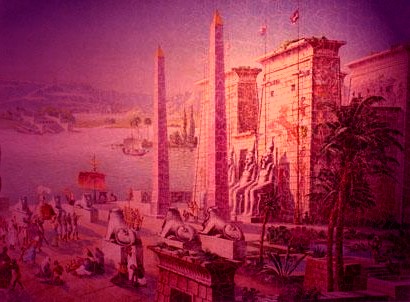
On October 24th the Religion of Antinous enters the holiest and most mysterious part of our religious year — The Sacred Nights of Antinous, which continue through November 1st.
We are commemorating the tragic death of the Beauteous Boy and his miraculous deification and the glorious founding of his Sacred City of Antinoopolis and the birth of a religion which had (and will have) millions of adherents.
Come with me as we head down the dark stairs beneath the Great Temple of Antinous — down, down, down through musty and dank corridors to the place where, on October 24th, we remember The Passion of Osiris, which is the creation of godhood from death.
These Sacred Nights ceremonies take place in utter darkness in the deepest and most secret part of the Great Temple of Antinoopolis. A few years ago Flamen Antinoalis Antonyus Subia wrote a detailed description of the Great Temple, including the catacombs where these ceremonies take place in the depths of the temple:
"...and then the tunnels wind down past little side chambers dedicated to secret gods with attendant priests to watch over little black covered altars...and at the lowest level is the Chamber of Antinous the Death Prince and Our Lady Death.
"It is a round vaulted room ... with a Romano-Egyptian theme ... in the large main niche is a colossal Antinous-Osiris standing on a golden Nile-barge ... and seated at his feet, on a golden throne, would be a life-size statue of Nuestra Senora La Santissima Muerte, holding her pomegranate.
"The walls of the chamber would be circled by the tombs of the Ancient Priests of Antinous, mummified of course, and encased in standing glass coffins, dressed in golden togas and gold wreaths with their heads turned towards Antinous, so that they can look upon him for eternity.
"And every surface of the walls is covered with thousands of little niches filled with little silver urns holding the ashes of all the believers who had earned the honor to rest, for all time, near the sacred boat of millions of years.
"And in the center of the chamber would stand an image of Hadrian, facing Antinous, dressed as an initiate of the Mysteries of Eleusis. THIS is where the Sacred Nights take place ... in the lowest and most horrifying part of the temple."
Here, in the deepest and darkest and scariest part of the Great Temple, we prepare to commemorate The Sacred Nights, which start with the initiation of Hadrian and Antinous into the Mysteries of Hermes/Thoth in the great city of Hermopolis on the banks of the Nile. It was Hermes/Thoth who imparted the Sacred Words (which is what "hieroglyphs" means) and magical spells to the goddess Isis by which she raised Osiris from the dead to ever-lasting life as a god.
On October 24th Antinous and the Imperial entourage were in the ancient city of Hermopolis, the Sacred City of Thoth/Hermes during the celebration of the Death and Resurrection of Osiris. It is believed that the spiritual forces of this occasion, and the Mysteries divulged to him by the Hermetic priests of the god Thoth, were the inspiration for this ascension into godliness.
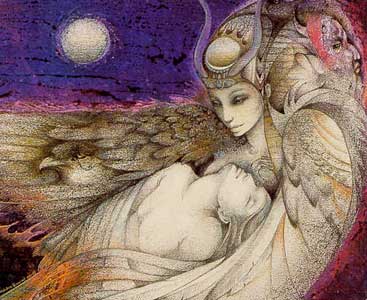
The story is that Osiris and Isis ruled Egypt as wise monarchs and that Osiris taught humans how to till the fields and harvest crops by using irigation water from the Nile. Osiris was loved by all mortal humans, which made his brother Set Lord of the Deserts, so envious that he decided to murder Osiris.
He gave a banquet for Osiris and, after getting Osiris very drunk, he suggested a game in which he and his brother would play a kind of hide-and-seek using large ornate boxes — coffins, really. He offered Osiris one box to hide in, but it was too small, so Osiris climbed into another, which was the perfect size. But before he could get out, Set and his henchmen sealed up the box and threw it into the Nile, where it was carried away, off out into the "Great Green" (as the Egyptians called the Mediterranean) and where it washed ashore in a foreign land.
Isis immediately set out, using the magical spells she had learned from Hermes/Thoth. After many adventures, she found the coffin with Osiris inside. Isis returned from Phoenicia (others say Lebanon) with the sarcophagus containing the body of Osiris. With the magical spells of Thoth's Scroll of Life (which features prominently in so many mummy movies), and with the keen senses of her faithful step-son, the jackal-headed Anubis, she embalmed the dead body to a semblance of life.
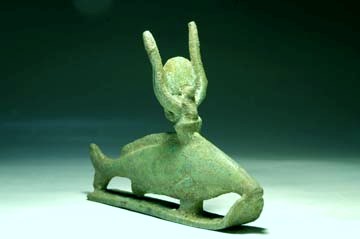
Set, however discovered that the body of Osiris had returned to Egypt and, together with his seventy-two henchman accomplices, he attacked the body and tore it into pieces, scattering the fragments up and down the valley of the Nile, like the seeds that are scattered over the fields when the Nile recedes.
Isis once again set out in search of the pieces. She found everything except the penis, which had been swallowed by the oxyrhynchos fish, which is why the oxyrhynchos fish has a penis-shaped snout and is why even to this very day Egyptians refuse to eat the flesh of this fish, because it is sacred.
With the skillful hands of Anubis and with the magic spells of Thoth, she was able to restore Osiris to wholeness. She even created a magical phallus which is eternally erect.
Isis is not called the Great Sorceress for nothing!
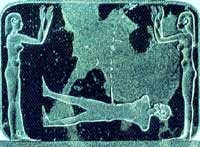
She transformed herself into a bird and so adeptly stimulated Osiris so that he ejaculated the magical "Semen of the First God" into her — in other words, she could make a dead man come, she was so hot.
Thus, hovering over the body in the form of a bird, she became impregnated with Horus who would avenge his father at the hands of his brother Set.
There are many versions of the Passions of Isis and Osiris. In one version, a version I especially like, Isis leaves the baby Horus in the care of the blessed scorpion goddess Selket, whose attendant scorpions fight off anybody and anything that comes near the baby, while Isis is off raising her husband from the dead so that he will be the Lord Of All Things Which Live and Die and Which Live Again For All Eternity.
The Passions of Isis and Osiris were played out annually in Ancient Egypt and formed the cornerstone of the Egyptian belief system — you could die horribly and tragically and yet you could be revived and restored and in fact you could become a god.
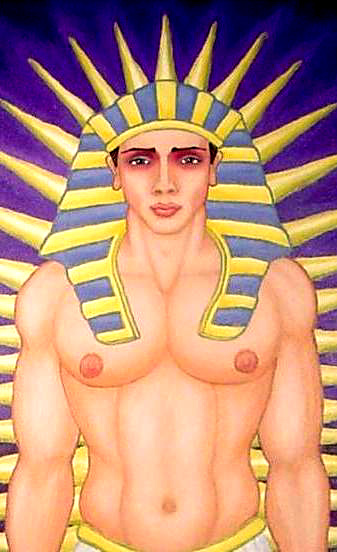
The festival of Osiris celebrated at Hermopolis and observed by Hadrian and Antinous commemorated the rending of the body of Osiris and the searching of Isis for each of the parts.
We believe that something of a cathartic nature happened within the soul of Antinous on October 24th. For it was only a few days later that he plunged into the Nile on the opposite bank across from Hermopolis. We will never know precisely what happened. Did Antinous get a glimpse at the fabled Scroll of Thoth? Did some Egyptian magician-priest teach him a bit about spellcasting? Did Antinous perhaps believe that he could use a spell to prolong Hadrian's life?
The Egyptians believed anyone who drowned in the Nile would become "a deified Osiris". Some Egyptian magical spells call for the magician to "deify a scarab beetle" — which means to drown it in Nile water and thus make it sacred and magical.
We will never know for sure what happened as a result of the ceremonies on October 24th.
Flamen Antinoalis Antonius Subia tells us:
"Like Osiris, Antinous descended into the Nile, and arose to bring the blessing of eternal life to the world. The Religion of Antinous, like the body of Osiris was scattered over the face of the world, and we who worship him, are like Isis, gathering the fragments together again.
"Hermopolis was the last city that Antinous ever saw, and the Passion of Osiris was the last religious ceremony in which he took part. Certainly it was here and at this time that an Awakening occurred, dark in its implications, causing Antinous to relinquish his life.
"But it was of splendid power in that, from the death of the boy, a god emerged. We observe that in Hermopolis, the scattering of the body of Osiris was the moment when the sperm of the blessed one was planted in the immortal spirit of Antinous, Our God."
The Sacred Nights of Antinous continue ....
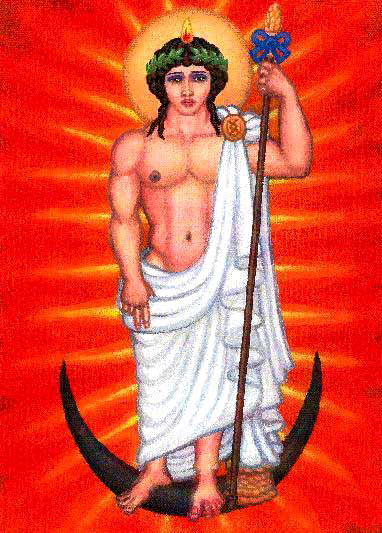
On this day, October 1st, the beginning of the holy month of the Sacred Nights of Antinous, we venerate Orpheus. Antinous our God was initiated into the cult of Orpheus so that his teachings became part of the Religion of Antinous, and therefore we receive the salvation that Orpheus accomplished through our god Antinous, the New Dionysus.
It is on this date that the Religion of Antinous remembers the blessed heritage of The Orphic Mysteries, into which Hadrian and Antinous were both initiated. The Orphic Mysteries teach that human souls are divine and immortal but doomed to live (for a period) in a "grievous circle" of successive bodily existences through reincarnation. This belief that each of us is divine and immortal — Man-Godliness-Becoming-One — is the mystery which Flamen Antinoalis Antonyus Subia calls HOMOTHEOSIS. By welcoming this divine force instead of rejecting it, we take the first step away from our instinctive animalistic fearful self on the long road to becoming a Shining One of Heaven.
Hadrian and Antinous must have known by heart the story of Orpheus in the Underworld: Orpheus was the son of Apollo and the muse Calliope, and from his father he received the Lyre and the gift of music. So powerful was the music of Orpheus that he could tame the hearts of beasts and birds and his song enchanted even the trees and stones.
He was one of the Argonauts who, together with Jason, retrieved the Golden Fleece. Returning from the journey, he married Euridice, but the marriage was short-lived because while fleeing the Shepherd God Aristaios (ironically also often depicted as a form of Antinous in ancient times), who was attempting to rape her, she was bitten by a snake hidden in the grass and died. Orpheus was so overwhelmed with grief that he used his powers of enchantment to travel to the underworld to bring back his wife.
His music soothed the three-headed dog, and gained his entry into the dark hall of Hades and Persephone. There he sang to the rulers of the underworld, and his song touched the cold heart of the Lady of Death. Persephone decreed that he could lead his wife out of hell provided that he did not turn to see her following.
Orpheus, singing as he went, very nearly succeeded, but at the last moment, at the very gate of darkness, he turned and saw his wife vanish back into oblivion.
Flamen Antinoalis Antonyus Subia tells the rest of the story, and why it is important to us:
"From that moment Orpheus was a changed man, he became a priest of Dionysus, and gave himself over to intoxication, completely shunning the company of women, and separating himself from the customs of the world. Orpheus is said to have been the first to sanctify homosexuality as an indulgence that frees the soul from continued reincarnation through the procreation of the flesh."His journey through the underworld gave him a deep detestation of death that he developed into a new philosophy. Orpheus taught that we were all children of the fallen star Dionysus-Zagreus, who had been torn to pieces by the Titans and consumed by them so that his light was mingled throughout their flesh. Zeus struck the Titans down with his lighting and from their ashes arose mankind, fashioned by Prometheus.
"So that we will never suffer the fate of passing into the realm of Hades, Orpheus taught that we must restrain our titanic nature and restore the purity of our godliness, we must become Bachkoi, which is that we must become Dionysus again. A pure life, free from murder, including blood sacrifice and the eating of meat is required, and we must undergo initiation into the blessed rites which he inaugurated.
"Although part of the religion of Dionysus, the Orphic cult was limited to men. Orpheus wrote volumes of sacred poems that comprised the heart of his new religion. The Orphic cult was a combination of the freedom and indulgence of Dionysus, tempered with the high-minded nobility of Apollo.
"The Orphics denied the world and set their minds on the inner light of Dionysus so as to liberate the soul from imprisonment within the flesh."
You can see the parallels between the story of Orpheus and Eurydice and the true-life story of Hadrian and Antinous. The emperor mourned and wept and sought to bring his Beloved Boy back to the world of the living. Hadrian's route through the Underworld was of a purely spiritual nature. He recognized that Antinous had always been Divine — a fact which is a tenet of The Orphic Mysteries. He decided to establish a religion which would enable the followers of Antinous to become aware of their own Divine Nature and to become one with ANTINOUS THE GAY GOD.
It is indeed ironic that this beautiful religion was born out of Hadrian's inconsolable grief. But the divine regenerative sacred force of this phenomenon is the secret behind the Tarot Trump called Death.

Death occurs in so many forms. We experience Death in some form every day of our lives. Loss of job. Loss of a lover. Loss of a friendship. Loss of money or status. Loss of confidence in ourselves ....
When we experience any kind of devastating loss, whether it is the loss of a loved one, a dream, a job, or a relationship, feelings may arise within us that are overwhelming or seemingly impossible to cope with.
And while it may feel like we are caught up in a never-ending spiral of sadness and emptiness, it is important to remember that the grief we are feeling is not a permanent state of being. Rather, grief is part of the process of letting go that in many ways can be a gift, allowing us to go deeper within ourselves to rediscover the light amidst the seeming darkness.
We have to remember Hadrian wading into the waters of the Nile and hoisting the cold and lifeless body of Antinous into his arms and weeping in rage — rage that all of powers could not prevent this tragic loss. He couldn't believe it had happened. Not to Antinous. Not to himself ....
A sense of shock or denial is often the first reaction, to be replaced by anger. Sometimes this anger can be directed at your loved one for "abandoning" you. At other times you may feel outrage toward the universe for what you are enduring.
And while there are stages of grief that people go through — moving from denial to anger to bargaining to depression to acceptance — the cycles of grief often move in spirals, sometimes circling forward and then back again. You may even experience moments of strength, faith, and laughter in between. While these emotions seem to come and go sporadically, it is important to feel them, accept them, and allow them to flow. With time, patience, and compassion, you will eventually find your center again.
As we move through our grief, we may find ourselves reluctant to release our pain, fearing we are letting go of who or what we have lost. We may even regard our movement toward healing as an act of disloyalty or giving up.
But try to remember Hadrian. Try to realize that, while the hurt may fade, the essence of what you had and who you loved will have already transformed you and forever stay with you. If anything, once you are ready for the pain of your loss to subside, their memories can then live more fully within you.
Antinous was only a low-born pleb with no official status or rank. And yet, through his dramatic death, he bound himself to Hadrian forever ....
So when you are in the pit of Orphic despair over a tragic loss — the loss of a good job, or a relationship, or a beloved pet or perhaps the loss of trust in someone or in yourself — try to remember that healing is a part of the spiraling cycles of grief, and that in letting yourself feel restored again, you are surrendering to a natural movement that is part of the dance of life.
Your grief can be the powerful gnosis which makes you remember that you are the musician. You are the dancer. You are that which has died and entered the Underworld. You are also that which rises re-born bright and shining like the dawn sunrise.
It is the process (because it is a process and not a method) which Flamen Antinoalis Antonyus Subia calls HOMOTHEOSIS ... "Gay-Man-God-Becoming-the-Same-As-Gay-Man-God."
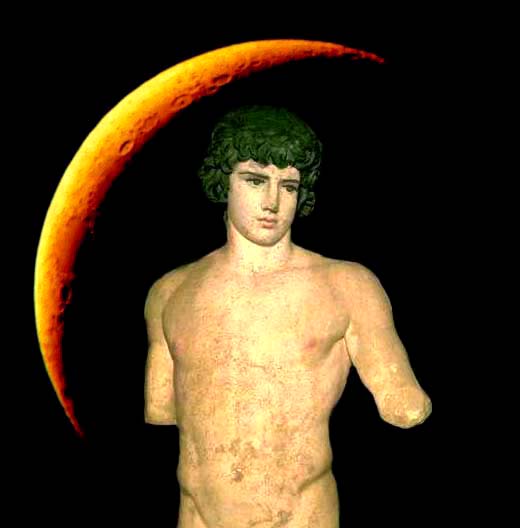
On September 21st the Religion of Antinous commemorates the FEAST OF THE PERSEPHONEA — the initiation of Antinous into the ELEUSINIAN MYSTERIES in Greece at the outset of Emperor Hadrian's Imperial Tour of the Eastern Provinces.
As Sacred Synchronicity would have it, this anniversary coincides this year with the GEMINI THIRD QUARTER MOON, the Lunar Phase which we call the "Consolation Moon" or the "Moon of Antinous/Eleusis".
Historical records state that, in the late summer of the year 128, the Imperial Court embarked on a grand tour of the East. The Empress Sabina, Hadrian's wife, and her attendants were members of the entourage.
But on this particular journey, Antinous was the most favored of Hadrian's companions. Their love affair was openly, and gracefully displayed before the eyes of the world. This journey through the East, what we call the SACRED PEREGRINATION, is the only part of the short life of Antinous that history has conveyed to us.
For this reason it takes on the importance of a sacred epic. Antinous was in the very flower of his beauty and vigor, he was a shining star held in the wings of the Imperial Eagle, and it is no coincidence that this court of demigods should travel through the lands of Ganymede, Attis, Adonis, Jesus and Osiris, who were all beautiful souls taken from life before their time.
The court stayed in Athens for five or even six months, they arrived in time for the celebration of the MYSTERIES OF ELEUSIS, which symbolically portrayed the rape of Proserpina by Hades, the mourning of her mother Demeter, and the return of Spring.
In the modern Religion of Antinous, we commemorate these ELEUSINIAN MYSTERIES on September 21st, the Autumnal Equinox, for it is believed that Antinous underwent the secret initiations provided by the priests of Eleusis. Through them he received the consecration of the dark goddess of the underworld Proserpina, which prepared him for his own death and resurrection.
In the Mysteries of Eleusis, the initiates are led into the realm of death and are confronted with immediate death. Two years later, in 130 AD, Hadrian and Antinous would indeed be confronted by physical death. In the Mysteries of Eleusis (and indeed in the Underworld after Death), the initiates cannot go back the way they have come. And they cannot go forward without knowing the Words of Power that will allow the gatekeepers to throw open their gates.
But we face such situations not only in secret initiations, or on our deathbeds. No, we face such "mysteries" every day of our lives. We put off our dreams and aspirations so we can cope more effectively with the challenges of the present, ostensibly to have more time and leisure to realize our purpose in the future. Or we tell ourselves that we will chase our dreams someday once we have accomplished other lesser goals.
In truth, it is our fear that keeps us from seeking fulfillment in the here and now — because we view failure as a possibility, our reasons for delaying our inevitable success seem sound and rational. If we ask ourselves what we are really waiting for, however, we discover that there is no truly compelling reason why we should put off the pursuit of the dreams that sustain us.
That is what "mystery initiations" are all about. Hadrian and Antinous were forced by the Eleusinian priests to confront their fears and to find a way to go forth into life — NOW. They had no options. It was now or never. Life or Oblivion. In our own lives, we face the same question every day. And usually we try to find a way to avoid the question.
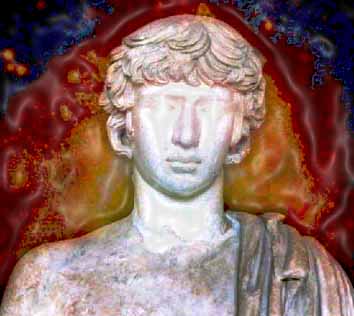
When regarded as a question, "Why not now?" drains us of our power to realize our ambitions. We are so concerned with the notion that we are somehow undeserving of happiness that we cannot see that there is much we can do in the present to begin courting it.
Yet when we look decisively at our existence and state, "Why not now, indeed!" we are empowered to begin changing our lives this very moment.
We procrastinate for many reasons, from a perceived lack of time to a legitimate lack of self-belief, but the truth of the matter is that there is no time like the present and no time but the present. Whatever we aim to accomplish, we will achieve it more quickly and with a greater degree of efficiency when we seize the day and make the most of the resources we have at our disposal right now.
All the joy, passion, and contentment you can envision can be yours right now, rather than in some far-flung point in time or in some parallel universe or after you have read the necessary books or earned the appropriate degrees or have made enough money in just the right job. Or after you have won the Wednesday lotto ... and then perhaps the Saturday lotto ....
You need only remind yourself that there is nothing standing between you and fulfillment. If you decide that today is the day you will take your destiny into your hands, you will soon discover that you hold the keys of destiny.
It is not about bowing down before a graven idol or a crucifix or a molded resin icon blessed by the Dalai Lama personally (allegedly) or anything else.
The idols, the images, the icons, the gilded statues and the gods themselves are as nothing.
YOU YOURSELF HOLD THE KEYS TO FINDING AND FULFILLING YOUR OWN DESTINY.
It is yours to find and to fulfill. No one else's. Not even the gods'.
That is what the ELEUSINIAN MYSTERIES are all about. And that is what the PERSEPHONEA is all about. And the Journey Up the Nile by Hadrian and Antinous to their Fateful Destiny with Eternity. And it is also what the symbolism of the Equinoxes is all about.
Even if the days are getting shorter, they are also getting longer — it is all a matter of perspective. The days ARE getting longer — our brothers in South America, South Africa and Australia can look out the window and see the lavender blossoms of the jacarandas in springtime bloom.
Remember Hadrian and Antinous in the Underworld (or on their Fateful Voyage Up the Nile) and understand what they understood: That the keys of fate are in your hands and you can venture forth RIGHT NOW wherever you wish to go.

It is the dawning of the 21st of August and the Sun is aligned with Mercury and Venus in the fiery sign of Leo the Lion — and all three are in opposition to Aquarius Neptune, turning dreams into reality.
All around the world worshipers of Antinous commemorate The Sacred Lion Hunt which climaxes on Sunday evening with solemn rituals at the HOLLYWOOD TEMPLE OF ANTINOUS.
The place is Egypt, somewhere in the rocky wilderness between the scattered oases south of Alexandria. The time is August of the Year 130 AD. The Sun is in the Sign of Leo. The Constellation of Aquila the Eagle is at its zenith in the nighttime sky — just as it is now.
It is the constellation of the Emperor. And the Emperor and his Beloved are touring Egypt when they hear grisly accounts of a man-eating lion marauding the countryside on the edge of the cultivated land. The "Marousian Lion" it was called.
They lead a hunting expedition out into the wilderness. The whole expedition is rife with symbolism from the start since the Sun is in Leo in the daytime skies and the Eagle is soaring in the nighttime skies and the Ancients believed killing lions was tantamount to defeating death itself. Lion hunting was the sport of kings.
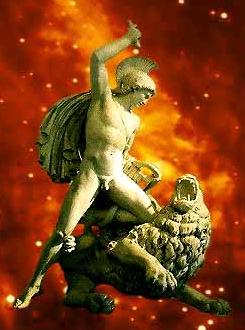
When at last the Imperial party flushes out the man-eater, the huntsmen and archers stand back and leave Hadrian to close in on the beast with his steed. Hadrian has just got off an arrow which wounds the animal when, all of a sudden, out of nowhere, young Antinous rides ahead, his reins in his left hand, an adamantine-tipped lance in his upraised right hand.
As the Imperial retinue looks on in horror, the snarling lion charges toward the boy, causing his panicked horse to whinny and wheel about in terror. But Antinous maintains his balance and, instantly judging distance and angle, sends his lance sailing towards the lion as it quickly closed the gap between them.
The lance slams into its rear flank, inflicting a serious but not fatal wound. Enraged even more, the lion uses its fangs to pull out the lance and charges anew against the Boy who is fumbling with his quiver to ready a shot with his bow. But an arrow is already in the air from behind Antinous, and it whizzes past his ear and hit its mark in the throat of the lion.

It has been fired by Hadrian, who is approaching at full gallop and who, even while the first arrow was still in the air, had already readied a second arrow, which this time penetrates both lungs.
The lion spins about and collapses writhing in the dust, rage in its eyes, blood and saliva guttering from its fanged mouth, gasping for breath as it struggles to get to its feet — because Antinous has dismounted and is sprinting toward it with a drawn dagger.
Hadrian draws his steed to a halt and dismounts with an agility and lightness befitting a man half his age, fueled by adrenalin and alarm for his Beloved Boy, who faces imminent peril from the mortally wounded lion, still capable of severing an artery with one swipe of its mighty paw.
Hadrian draws his hunting axe from his belt and holds it high as he lunges onto the lion's back and dispatches the beast with one powerful blow which splits its skull in two with a frightening crack and a spurt of bright red blood which bathes both the older man, now panting and perspiring heavily, and the younger man who still shows no visible expression of concern, just a wild-eyed look of excitement in his eyes, as if he never realized the danger he had been in — as if he thinks he is immortal.
A cheer goes up from the coterie of onlookers when they realize the lion is dead, killed seemingly by a single blow from the Emperor's hand. Courtiers whose eyes are unskilled in the ways of hunting will later claim Hadrian had struck the lion dead with a club.
As soldiers and nervous bodyguards rush forward to make sure everything is all right, the emperor, his adrenalin-strength ebbing as quickly as it came, shakily wraps a blood-spattered arm around Antinous and plants his gilded, spike-soled sandal on the dead animal's neck and nods to Antinous to do the same.
There they stand, bathed in blood and bathed in the adulation of the Imperial coterie, each with one foot on the vanquished man-eater as the animal's blood spreads out and covers the surrounding rocks and sand and a few scrubby wildflowers growing from a crevice in a rock.
Even the flowers are splattered with blood. And these red blossoms will be plucked by members of the entourage to take back as souvenirs to show to envious courtiers who had not been invited along.

THE SACRED LION HUNT was immortalized in poetry and in stone, with Hadrian adding medallions to the Arch of Constantine showing him and Antinous with feet on the lion's neck and also making sacrifice to the great lion-killer Hercules.
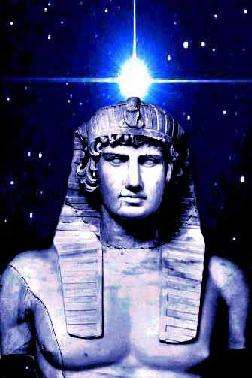
Soon legend would have it that scarlet-red lotus blossoms had sprung forth from the pool of the lion's blood, the lion which had been brought down by Antinous and which had been dealt its death blow by Hadrian — the SACRED RED LOTUS.
Under the Sign of Leo. And under the Constellation of the Eagle.
Within a few short weeks, Antinous himself would be dead. The Sacred Lion Hunt is the last recorded event in His short life.
And some time afterward, grieving Hadrian would look up into the nighttime skies with tear-filled eyes and his court astronomers would point out a New Star which had appeared in the southern part of the Constellation of Aquila the Eagle.
The New Star would be interpreted as a celestial sign that Antinous had been raised to the firmament, that the Constellation of the Imperial Eagle had been joined by the CONSTELLATION OF ANTINOUS. It was a sign that Antinous was now a God.
If you go outside tonight and peer out into the darkness with all its deep and hidden dangers, remember Antinous and how he peered out into the barren wilderness with all its deep and hidden dangers. He charged forth, his bridle-reins in his left hand and an adamantine-tipped lance in his right, and he faced death unafraid.
For Antinous knew he was immortal.
The Constellation of Antinous, still under the wing of the Imperial Eagle, will be right directly over your head tonight — shining proof that Antinous is a God and that he is indeed immortal.
Don't look out into the darkness around you and be afraid. Instead, look up and remember the Beloved Boy, who was a fearless hunter, who stalked death itself, and who emerged victorious over it.
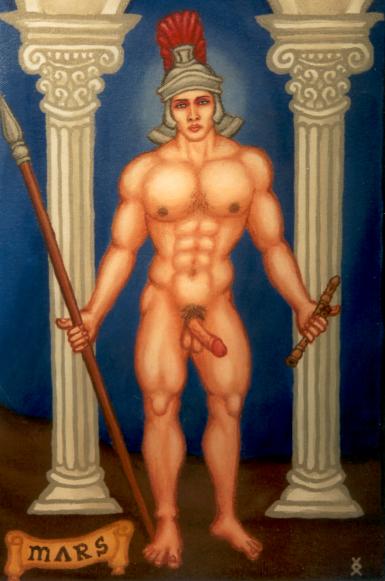
On August 20th the Religion of Antinous commemorates the Sacred Band of Thebes, the Army of Gay Lovers whose courage and valour have echoed down through the ages as an inspiration that Gay Love is a magical means of Conquering Fear and Doubt.
The Sacred Band of Thebes, also called The Theban Band, was a battalion composed entirely of homosexual friends and lovers. This military unit, consisting of 150 male couples, was based on the belief that men fighting alongside their lovers would die rather than shame one another.
According to Aristotle, the Army of Lovers were sworn into military service at the Tomb of Iolaus, one of the many male lovers of Hercules. Iolaus had helped the god in the Twelve Herculean Tasks.
He often acted as Hercules' charioteer and companion, and the closeness of their relationship was such that he was known as Heracles' symbomos (altar-sharer), since the two could be honored at one and the same altar — a very rare occurrence in ancient Greece, where each divinity would have his or her own altar.
Iolaus was called the eromenos (beloved boy) of Hercules, and was thus a Sacred Hero of same-sex love in Thebes. Hercules, Iolaus and Eros were often depicted together.
That is probably why the army of gay lovers was called the Sacred Band, since they took their oath of allegiance at the Sacred Tomb of Iolaus, which was at the same time a shared sacred altar to Hercules. In effect, the warriors were swearing that they would fight alongside their comrades the same way Iolaus and Hercules fought together — armed with the arrows of Eros.
You can see the parallels to Hadrian and his beloved boy Antinous, and later this week the parallels become even clearer when we commemorate the SACRED LION HUNT. After that hunt in the Libyan desert in the summer of the year 130 AD, Hadrian and Antinous made sacrifice to the Great Lion Slayer Hercules — thus cementing the identification between Hadrian/Hercules and Antinous/Iolaus — and their affiliation with the Sacred Band of Thebes.
The great Theban general and tactician Epaminondas is generally credited with establishing The Sacred Band, although some sources claim it was his "beloved friend" Pelopidas who was responsible for recruiting them. No matter — they both fought side-by-side at the head of The Sacred Band.
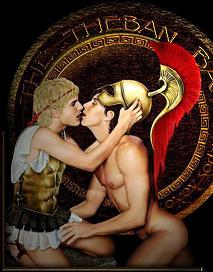
This corps d'elite first took to the battlefield against Sparta, which had dominated Greece since the fall of Athens in 404 BC. The Spartans were confident of victory, as they had never suffered a defeat on the battlefield — never ever.
Deploying the Sacred Band on his front left wing, "Epaminondas made his left wing fifty deep and flung it forward in the attack." The "extra weight" of this wing and the "fanatical bravery of the Sacred Band" broke the Sparta right wing, which contained their best warriors. In the ensuing hand-to-hand combat, the Spartan king was killed and their right gave way.
Witnessing this, the rest of the Spartan forces, who had not yet been engaged, fell back in disarray, running for their lives. Thus, Sparta suffered their first recorded defeat in more than 400 years — at the hands of an Army of Gay Lovers.
But the end came in 338 BC at the battle of Chaeronea when King Phillip II of Macedonia and his son Alexander (later called Alexander the Great) defeated the combined forces of Athens and Thebes-Boetia. Alexander confronted The Sacred Band of Thebes, the elite corps of 300 homosexual lovers who were by that time the most respected soldiers in the world.
But alas! They were no match for the Macedonians under Phillip and Alexander. It was a rout. The Athenian and Theban armies gave way and began retreating from the advancing Macedonians. Only The Sacred Band stood their ground — and died. Only a few were subdued and captured. Of those who died, it was found that not one had been wounded in the back — a sign that they had not turned away from the fight.
Alexander was so moved by their nobility and courage that he asked his father to bury them with honour and raise a monument in the form of a Sacred Lion over their mass grave. In 1881, the shattered fragments of this Lion Tomb were discovered, surrounded by the bones of 254 pairs of men with their weapons, arranged in a phalanx of seven rows, the battle formation of the Sacred Band.
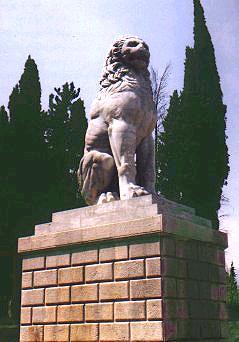
In 1902 the fragments of the Sacred Lion were reconstructed and placed again over the tomb of The Sacred Band (depicted left) by the secret homosexual society known as the Order of Chaeronea, founded by gay-rights pioneer George Cecil Ives.
It reminds us once again of the Sacred Lion Hunt which we celebrate later this week.
So, what has all of this got to do with us in our daily lives? We're not soldiers. We're not brave and courageous. Like Dorothy Gale, we're meek and mild. Timid. We know that if we were on a battlefield, we would turn and run. We would hide and "play dead" and hope nobody found us.
We assume that the Army of Gay Lovers were all fearless. We think they were unafraid. We don't think of them as being saredy-cats like us. We think they didn't mind the prospect of agonizing death. We think they were somehow above such mortal fears and doubts.
That's nonsense, of course. They were scared out of their wits. We can scarcely imagine how afraid they were. As they stood there alone against the mightiest army in the Ancient World, their emotions shifted beyond the mere terror of possibly being killed, to the actual horror of inescapable agony and death. It is one thing to be terrified — we all know the fears generated by terrorists who fly airliners into buildings.
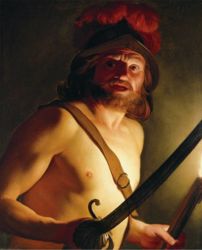
But the emotions experienced by those trapped in the planes or inside the burning buildings go far beyond mere terror to the actual horror of inescapable agony and death. That is the Mystery of Terror as opposed to the Mystery of Horror. We tend to forget the distinction!
The Army of Gay Lovers were not without fear. On the contrary, they were staring into the horror of impending pain and death. But they did not allow their fear to overwhelm them. Instead, they turned their fear "inside-out" and used it as a magical shield. The barbs of fear were no longer poking inward to themselves, but instead were pointing outward towards their foes.
And that is the Mystery Teaching of the Army of Gay Lovers. It was no doubt part of the initiation which the recruits underwent at the Tomb of Iolaus. They were schooled in magico-religious methods for handling fear. It's about learning to harness Mars energy. Mars is all about the double-edge sword of fear/bravery and how you can learn to wield that Sword of Mars.
It's not about being fearless. It's about being able to transform your fear into a mighty force which wins the battle of life. Mars Warrior Energy is not about death. It is about LIFE. It is about harnessing fear and doubt and turning them into useful energies in your daily life.
By the way, August 20th, 2011, is astrologically significant because ANTINOUS THE MOON GOD aligns with Jupiter in Taurus and both are in a positive sextile to the warrior planet Mars. Meanwhile, the Sun, Venus and Mercury are aligned in conjunction in fiery Leo — all in opposition to dreamy Aquarius Neptune. Astrologically, these celestial alignments symbolize the Sacred Band of Warrior Lovers. And anything-goes Aquarius Neptune dissolves all barriers of ego and selfishness, permitting the Leo Sun/Mercury/Venus to shine through your heart with valour and spiritual insight. But when you think about it, this year is not so special. That's what life is all about. Life — from the time you are born until the time you die — life is just one constant battle. And if you give in, then you are lost. And if you give in to the fear and doubt that constantly confront you each and ever day, then you are lost. It's about using selfless love and transcendant awareness to transform fear and doubt into constructive energies which empower you to stand up and wade into the fray of daily life.
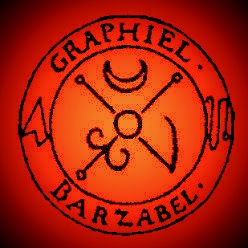
The Band of Thebes were initiated into Mystery Teachings which showed them how to transform fear and doubt into a magical force which made them invincible — capable of asserting their will and making their dreams become reality. And the catalyst was male-male love and devotion.

This is one of the deepest and most profound Mystery Teachings of the Religion of Antinous. We are talking about the Mysteries of Antinous-Mars. This is why Flamen Antinoalis Antonius Subia has painted Antinous in the guise of the War God (above left). Antinous is not just about gay male beauty. He is about gay male warrior energy.
Mars is a very important constituent aspect of Antinous. In Fixed Star Astrology, the STAR OF ANTINOUS is characterized by a mixture of Jupiter/Mars energy along with Venus energy — unique among Fixed Stars. To overlook Mars is to overlook a major component of what Antinous is all about.
Mars and his Alchemical Intelligence Graphiel and Daimon Barzabel (Deimos and Phobos) is much misunderstood by philosophers and occultists. The fiery Graphiel/Barzabel energies of the red planet ("terror" Deimos and "horror" Phobos) are often seen as frightful and horrific and destructive and warlike with no other qualities. This is a shallow analysis and one that should be discarded. Understanding your Martial nature — the Antinous-Mars warrior inside you — is essential to your survival and growth as a gay man. Terror and horror accompany us all our lives.
We are all afraid every day. We are all riddled with doubts every day. Look around you — most people are consumed with fear and doubt. Fear fuels their lives! But each of us can learn to turn our fears and doubts "inside-out" so that their barbs no longer point inward towards us, but instead so that these barbs of fear and doubt form a protective shield around us. It girds us with a constructive energy which helps us to advance through the Herculean travails which we face in our daily lives. Instead of being "fearfully" timid, we become "fearsomely" determined not to let life get us down.
Tomorrow, this transformational ability to turn fear "inside-out" will help us to understand how Antinous was able to charge the man-eater during the SACRED LION HUNT.
He must have been terrified. He was young and inexperienced and alone on his steed and armed only with an adamantine-tipped lance.
But through his loving bond with Hadrian/Hercules, Antinous/Iolaus was also magically armed with the "fearsomely strong" energies of the Sacred Band of Thebes.
Flamen Antinoalis Antonius affirms: "We consecrate and honor their memory and call upon their strength and courage in our own hearts, that we may become the New Sacred Band."
![]()
My husband Klaus and I were sitting at breakfast listening to the radio when the announcer said something about the spectacular shooting stars tonight. And Klaus asked, how does he know there are going to be shooting stars tonight? So I said the Earth goes around the sun and there's a spot when its orbit crosses a bunch of meteors every August and they hit the atmosphere — like bugs on the car windshield/windscreen.
What goes around comes around and the Perseid Meteor Shower has reached its peak. And the Moon has come around again and it's time for the AQUARIUS FULL MOON, which also only happens once a year in late summer (or late winter if you're in the Southern Hemisphere).
The AQUARIUS FULL MOON is the full moon of letting go, breaking out of restrictions, busting out of prisons, liberating yourself from the chains which restrain you. It represents a boon (material or otherwise) which comes your way through generosity. It is an unexpected gift from someone else. Or it is a gift you give to yourself. The AQUARIUS FULL MOON is about philanthropic generosity.
In the Religion of Antinous, the AQUARIUS FULL MOON is represented by Antinous-Vertumnus, which is the divine aspect of Antinous representing his gift-giving ability. He holds a symbolic gift of fresh-ripened fruit and summertime blossoms which he is eager to give to you without reservation. It's yours. No questions asked. Take it.
Vertumnus also symbolizes his ability to morph and change bad luck into good luck. The Ancient Etruscans believed Vertumnus was a shape-shifter who could change his form at will. He brought gifts and bounty to those who had the "eyes" to perceive him in his many guises.
The Romans adopted Vertumnus and he became associated with the changing bounty of summertime, when fruit and vegetables materialized out of the ground and ripened and were ready for harvest — the bountiful gifts of nature.
According to Ovid's Metamorphoses, Vertumnus was enthralled with Pomona, the goddess of orchard fruits, and desired to be one with her. But she spurned him. He assumed many guises — a fisherman, a soldier, a peasant, a reaper, etc. — but she turned him away every time.
Finally, he assumed the form of an old woman and was so aged and unattractive that Pomona let down her guard. Thus, Vertumnus engaged her in conversation and they became inseparable — which was what Vertumnus had wanted all along.
Ovid says that the moral of the tale of Vertumnus and Pomona is that you should never judge a gift by its outward appearances. Never reject the hand of friendship.
The Ancient Romans celebrated the feast day of Vertumnus — the VERTUMNALIA — on August 13th by giving each other baskets of fruit, flowers and other symbols of nature's bounty.
By Sacred Synchronicity, August 13th 2011 coincides with the AQUARIUS FULL MOON, which is the Full Moon associated with Antinous-Vertumnus in ANTINOUS MOON MAGIC rituals.
The Leo Sun, Aquarius Moon opposition can have a liberating effect, as if you're floating above the Matrix that we get stuck in sometimes. Aquarius shatters the glass ceiling of ideas, so that innovations are in reach. Simultaneously, revolution-minded Pluto is in Capricorn, directly opposite Mars in Cancer, and Pluto/Mars are shattering established business and political structures — as we read in the headlines every day. Meanwhile, Mercury and Neptune are in opposition to each other, blowing away long-held illusions.
Go outside tonight and look up at the full moon, with shooting stars cascading from all sides. This is the FULL MOON to wake up and break free of all mental, spiritual, political and ideological strictures. It is the gift of an opportunity. The shooting stars are symbolically aimed at you. Antinous is aiming his gifts of new opportunity directly your way. All you have to do is reach out and grasp it — and it's yours.

Funeral services were scheduled August 8th for Rudolf Brazda, last known survivor of the "Men With The Pink Triangles" — gays interned in Nazi camps because of their homosexuality — who has died in France at age 98.
"Rudolf passed on peacefully in his sleep at dawn on August 3" at a nursing home in Bantzenheim, eastern France, according to a statement issued by the Lesbian and Gay Federation of Germany.
Mr. Brazda, an ethnic Czech born in Germany, was sent to the Buchenwald concentration camp in August 1942 and remained there until it was liberated by US troops in 1945. The pink triangle was the emblem sewn onto the striped uniforms of the thousands of homosexuals sent to Nazi concentration camps, most of them to their deaths. Mr. Brazda was lucky that US troops liberated Buchenwald before he was to be killed.
After the war he moved to Alsace, the eastern French region that borders Germany, and lived there until his death.
He was awarded France's Legion of Honour in April this year.
He lived in virtual obscurity until May 2008, when he was invited to take part at ceremonies in Berlin dedicating the world's only Gay Holocaust Monument. Some 500 people were on hand, as Berlin's openly gay Mayor Klaus Wowereit personally welcomed Mr. Brazda with a long-stem rose, and led him to the monument (photo below left), across the street from the site of Adolf Hitler's bunker.
I took part in the dedication ceremonies (photo at right) and had the honor of shaking hands with Mr. Brazda on behalf of the Religion of Antinous.
Mr. Brazda was born in 1913 in Meuselwitz, Germany, the last of eight children to Czech parents who had emigrated to Saxony in the southeast, where his father worked in the coal mines.
As a young man, Brazda had wanted to work in the local gentlemen's outfitters shop. When he failed to get an apprenticeship, he trained as a roofer.
In Germany in the early 1930s as the Weimar Republic came to an end, male homosexual acts were still outlawed under Paragraph 175 of the German Criminal Code. But there was a climate of relative tolerance in which Brazda lived openly, meeting other homosexuals and cohabiting with his partner in a room they sublet from a Jehovah's Witness landlady.

Then the Nazis came to power and enforced the laws against homosexuality and added increasingly harsh new bylaws. By the mid-1930s gay men were being rounded up and brutally interrogated. Gestapo and regular police officers extorted names and addresses of patrons from gay bar owners. And when men were taken in for "questioning", they would be told they would be released if they divulged the names of all their gay friends — after which they learned they were being "released" to concentration camps.
Landlords were paid rewards for reporting gay tenants. In one case in Hamburg, a landlord and his wife took turns standing on a chair to peer through the transom to catch a gay tenant "being intimate" with a male guest in the privacy of his own rented room. They alerted police, who barged in and arrested both men unawares.
Raids were staged on businesses with gay employees and gay workers were hauled away. At a large department store in Hamburg in 1937, a mass raid was staged and dozens of gay employees were dragged off as customers and staff looked on in stunned bewilderment. Some were sent to jail. Others underwent "experimental treatments" at mental hospitals where they received shock treatment and were castrated. An estimated 50,000 ended up in concentration camps.
Mr. Brazda was arrested after a friend was beaten into giving police his name. After incarceration in police jails, he eventually was sent to Buchenwald. Watching others die, he became determined to survive one way or another. He cajoled and flirted with camp guards, offering sexual favors in hopes of leniency. That strategy paid off. One day, after giving an SS guard the wrong answer to a question, the guard attacked him, knocking out three teeth and ordering his execution. But another guard, one of Mr. Brazda's regular sex customers, stepped in to convince his superiors that Mr. Brazda was a vital worker, and so he was given a reprieve.
"Others died, but I came through," he would say later, recalling the horror of the camps.
In the final days of the war, when appalling film footage of concentration camp victims shocked the world, Heinrich Himmler ordered remaining camps to be evacuated so as to avoid further embarrassment. And so SS guards set off with prisoners on long marches, costing the lives of many. But once again, Mr. Brazda survived because a guard hid him for three weeks and gave him food. American troops liberated the camp April 11, 1945.
After the war, Mr. Brazda settled in Alsace, France, near the French-German border. It was there that he met his partner Edouard Mayer in 1950, and they remained together until Edi's death in 2002.
In 2008, when Brazda learned that a memorial was to be unveiled in Berlin to homosexual victims of Nazism, he made himself known. Subsequently, two books have been written about Mr. Brazda. In one, Itinerary of a Pink Triangle co-authored by Jean-Luc Schwab, Mr. Brazda recalled how dehumanizing the incarceration was.
"Seeing people die became such an everyday thing, it left you feeling practically indifferent," he said. "Now, every time I think back on those terrible times, I cry. But back then, just like everyone in the camps, I had hardened myself so I could survive."
When he traveled to Germany to see his records from Buchenwald, Mr. Brazda noted that millions were broken by the Nazi regime.
"But they were never able to destroy me. I am not ashamed," he said. "I have made my peace with the past."
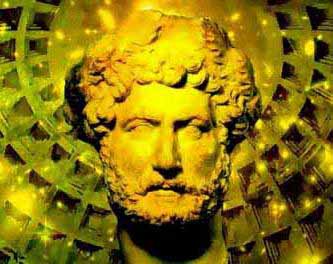
On August 1st the Religion of Antinous commemorates the fateful final journey which Hadrian and Antinous took together, and which would end in the death of the Beloved Boy on the Nile in Upper Egypt.
It was on this day in the year 128 A.D. that the Imperial entourage set out from Hadrian's Villa outside Rome for what had been planned as a triumphal tour of the Eastern Empire — Asia Minor, Antioch, Jerusalem, Alexandria and a voyage up the Nile to Thebes.
Hadrian is the only emperor to have traveled throughout the whole of Roman Empire, having visited every province from Brittania to Israel, and from the Danube to North Africa, several times. He enjoyed personally overseeing the administration of his government, and he was deeply interested in improving the lives of his subjects by tangible means. Hadrian was in love with the Greek ideal of civilization, and was devoted to carrying his vision of a perfect world to every corner of the Empire.
So it was that in the late summer of the year 128, the Imperial Court embarked on a grand tour of the East. The Empress Sabina, Hadrian's wife, and her attendants were members of the entourage, but on this particular voyage, Antinous was the most favored of Hadrian's companions. There love afair was openly, and gracefully displayed before the eyes of the world.
In the Religion of Antinous, this is the start of our three-year Sacred Calendar, known as the Peregrinatio ad Orientem, which follows the progress of Hadrian and Antinous on their Tour of the East, starting with their departure from Hadrian's Villa at Tibur — and ending with the death and deification of Antinous.
Flamen Antinoalis Antonyus Subia sets the scene for the departure from Tibur:
The inner circle of Hadrian departs from the Villa at Tibur with solemnity and with prayers to Mercury the god of travelers. The Villa at Tibur is regarded as the second most sacred city after Antinoopolis because it was here that Hadrian and Antinous lived together for most of their relationship, it was from here that Hadrian would later disseminate the religion of Antinous, and it is believed that the tomb of Antinous may be located in an unexcavated corner of the vast ruins. As they depart, Antinous is the acknowledged favorite of Hadrian. This is the last moment that Antinous spent in the West, and is observed in solemnity as the departure of Antinous from the repression of Rome to the loving embrace of Greece. The fall of the ancient religion and the destruction of the Holy City of Antinoopolis are mourned, as the meaning of the departure is also the occasion where we remember the fall of his glorious religion, and the centuries of silence which have preceded our revival.
Before leaving Rome, the Senate, Pontiffs, Flamenes, and all priesthoods, were summoned by Hadrian to the Pantheon, and there they conducted a solemn ceremony of benediction and safekeeping, for the benefit of the Emperor, for the City and for the World. With Antinous at his side, Hadrian announced his purpose for leaving Rome and journeying to the provinces. He enumerated his plan to improve the cities of the east, detailing his building projects, and the social, political reforms that would be enacted.
Flamen Antonyus continues:
Hadrian then made sacrifice to Jupiter Optimus Maximus, the ruler of Rome, while the Senate, in the name of Jupiter, blessed Hadrian and Antinous and the members of the court. Outside, the streets of the city were lined with people bidding farewell to their Emperor, who proceeded in a slow and grand procession. Antinous would have been prominently located near Hadrian as the procession left the sacred gates of the City. We pray to Our Lady Rome, mother of the world, to watch over us, and over civilization, her child, in time of danger, that the age of peace will come again.
Then on August 3rd, the Imperial entourage arrived at the port of Ostia to board a convoy of vessels to set sail. The Imperial Navy had gathered at the port of Ostia to escort Hadrian and the court across the sea to Greece. Ostia was the port city through which all trade bound for Rome passed. Sea going vessels were unloaded and their cargo was transferred to the riverboats that fed the ravenous gluttony of Rome.
Flamen Antonyus explains why Ostia is important to us:
The patron god of Ostia was Vulcan, the smith god, seconded by Mercury who watched over the trade business. Vulcan was the son of Zeus and Hera, and he characterizes the molten earth fire of volcanoes. The tremendous power of Vulcan made him a suitable husband for Venus, but their love, through constructive and passionate was volatile and unpleasant. Venus was constantly betraying the adoration and fidelity of her husband with countless lovers, especially with Mars. But the love of Vulcan for his beautiful wife was greater than jealousy and he forgave her countless indiscretions.
It is into Vulcan's hands, as intercessor and placator of Venus, that the hopes of the Imperial Navy rested as they departed from Italy. We pray to Vulcan, Mercury, Neptune and to Venus, Our Lady of the Sea, as Antinous journeys forth across the sea.
Hadrian departed on this journey in triumph, but he returned a broken, grief-stricken man. He never again left Rome. Hitherto known for his wisdom and tolerance, after Antinous died he became capricious and sometimes cruel, waging a long and bloody crackdown on Jews which set the stage for religious strife in the Mideast which echoes to this day.
Antinous departed on this journey as the Emperor's Favorite, a young man of no aristocratic standing, a provincial nobody. He would die under mystery-shrouded circumstances on the Nile. And he would become a God — the last Classical Deity — though the cult of the emperors continued for several generations, the divinized Emperors were never as widely recieved as the Religion of Antinous.

On July 25th the Religion of Antinous joyfully commemorates the First Miracle of Antinous — the Bountiful Inundation of the Nile which ended a drought which had caused food shortages throughout the Empire.
The famine had overshadowed the tour of Egypt by the Imperial entourage in the year 130. The half-starved Egyptians looked to Hadrian, whom they worshipped as pharaoh, to perform a miracle which would end their misery.
But as Hadrian and Antinous traveled up the Nile during the summer and autumn of 130, the Nile once again failed to rise sufficiently to water the fields of Egypt — Rome's "Bread Basket" and chief source of grain and other staple foodstuffs.
It was a humiliating disappointment for the Emperor following the jubilant welcome by peoples during the earlier part of his tour through the Eastern Empire. In Ephesus and other cities he had been welcomed as a living god.
But the Egyptians had given him and his coterie what little they had in the way of food and wine — and he had failed to convince the Inundation Deity Hapi to bless them with bounty. Hapi is one of the most extraordinary deities in the history of religion.
Hapi is special to us especially because Hapi is hermaphroditic. With many other such deities, the gender division is down the middle of the body (like some Hindu deities) or the top half is one gender and the bottom half is the other.
But Hapi is very complex and the genders are mixed throughout his/her body. Male deities invariably have reddish-orange skin in Egyptian Art and female deities have yellowish skin. Hapi has bluish-green skin. Hapi has long hair like a female deity but has a square jaw and a beard. Hapi has broad shoulders yet has pendulous breasts like a nursing mother. Hapi has narrow hips and masculine thighs, but has a pregnant belly. Nobody knows what sort of genitals Hapi has, since they are covered by a strange garment reminiscent of a sumo wrestler's belt.
Hapi is both father and mother to the Egyptians. Hapi provides them with everything necessary for life. As Herodotus wrote, "Egypt is the gift of the Nile". Hapi wears a fabulous headdress of towering water plants and she/he carries enormous offering trays laden with foodstuffs.
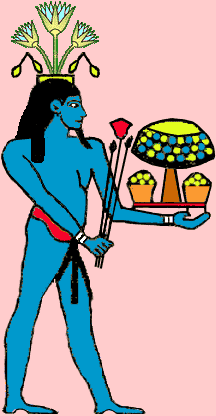
The Ancient Egyptians had no problem worshipping a mixed-gender deity. I think it is very important to draw the connection between Hapi and Antinous, especially since the First Miracle that Antinous performed as a god involved Hapi. The Egyptians accepted Antinous into their own belief system immediately and were among the most ardent followers of Antinous.
They had no problem worshipping a gay deity who had united himself with a hermaphroditic deity. It must have seemed very logical and credible to them.
It made sense to them and enriched their belief system, made it more personal since they could identify more easily with a handsome young man than with a hermaphrodite wearing a sumo belt (Hapi forgive me!).
Herodotus also said he once asked a very learned religious man in Egypt what the true source of the Nile was.
The learned man (speaking through an interpreter, since most Greeks never bothered to learn Egyptian) paused and finally told him the true source of the Nile is the thigh of Osiris.
We think of it as a strange answer. We think of the Nile as an "it" and the source as a "geographical location". But the Egyptians thought of the Nile as "us" and its true source as "heka" — the magical semen of the creator.
So, a learned Egyptian would have assumed that a learned Greek would understand what was meant: That Hapi is the equivalent of Dionysus, who was "incubated" in the inner thigh of Zeus after his pregnant mortal mother Semele perished when she could not bear the searing sight of her lover Zeus in all his divine panoply.
It's a very poetic way (a very Egyptian way) of saying that the "true source" of the Nile, which is to say Egypt itself, is the magical heka/semen from the loins of the original creator.
We will never know what happened during that journey up the Nile along the drought-parched fields with anxious Egyptian farmers looking to Hadrian for a miracle. All we know is that Antinous "plunged into the Nile" and into the arms of Hapi in late October of the year 130.
And then the following summer, Hapi the Inundation Deity provided a bountiful Nile flood which replenished the food stocks of Egypt — and the Roman Empire.
Our own Flamen Antinoalis Antonius Subia explains the more esoteric aspects of this special Religious Holy Day:

"The Dog Star Sirius appears, and the sacred Star of Antinous begins to approach its zenith in the night sky of the northern hemisphere. The appearance of the Dog Star once announced the rise of the Inundation of the Nile, though it no longer does due to the precession of the Equinox, which is the slight alteration of the position of the stars.
"After the Death and Deification of Antinous, the Nile responded by rising miraculously after two successive years of severe drought. It was on this day, July 25th, in the year 131 that the ancient Egyptians recognized that Antinous was a god, nine months after his death, following their custom of deifying those who drowned in the Nile, whose sacrifice insured the life-giving flood.
"Sirius is the brightest star in the sky, it is part of the constellation Canis Major, or the big dog, which is the hunting dog of Orion. Mystically, Sirius and the constellation Canis Major is Antinous Master of Hounds and Orion is Hadrian the Hunter.
"The position of Orion, along the banks of the Milky Way, our galaxy in relation to Sirius is a mirror image of Pyramids along the bank of the Nile, which is the same relationship as Antinoopolis to the Nile, with the Via Hadriani, the road which Hadrian built across the desert to the East, linking the Nile with the Red Sea — Rome to India.
"We consecrate the beginning of the Dog Days of Summer to the advent of the Egyptian deification of Antinous and the miracle of the Inundation of the Nile."

The First Miracle of Antinous the Gay God is enshrined in the hieroglyphic inscription on the OBELISK OF ANTINOUS which stands in Rome
The East Face of the Obelisk, which is aligned to the rising sun Ra-Herakhte, speaks of the joy that fills the heart of Antinous since having been summoned to meet his heavenly father Ra-Herakhte and to become a god himself.
Then the inscription tells how Antinous intercedes with Ra-Herakhte to shower blessings upon Hadrian and the Empress Sabina Augusta.
And Antinous immediately calls upon Hapi ...
Hapi, progenitor of the gods,
On behalf of Hadrian and Sabina,
Arrange the inundation in fortuitous time
To make fertile and bountiful, the fields
Of Both Upper and Lower Egypt!
We joyfully celebrate this, the First Miracle of Antinous!
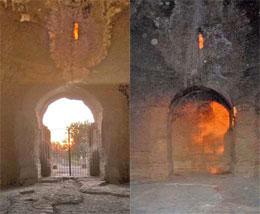
A tower at Hadrian's Villa which archaeologists hold to be the Emperor's own private observatory is in fact aligned to the solstices, according to a report in the journal Nature citing an Italian expert.
Until now, archaeologists had been mystified by the layout of the sprawling complex of marble baths, banquet halls, luxurious residences, gardens, shrines and unidentified structures 30 kilometers outside Rome.
But Marina De Franceschini, an Italian archaeologist, believes that the mystery-shrouded Rocca Bruna Tower, long held to be Hadrian's private observatory, is in fact aligned so as to produce sunlight effects for the seasons.
De Franceschini says that during the summer solstice, rays of light pierce the tower and another of the villa's buildings. In the Rocca Bruna Tower, dawn sunlight during the summer solstice enters through a wedge-shaped slot above the door and illuminates a niche on the opposite side of the interior (image courtesy nature.com). And in a temple of the Accademia building, De Franceschini has found that sunlight passes through a series of doors during both the winter and summer solstices.
"The alignments gave me a new key of interpretation," says De Franceschini, who adds that the two buildings are connected by an esplanade that was a sacred avenue during the solstices. Based on ancient texts describing religious rituals and study of recovered sculptures, she thinks the sunlight effects were linked to religious ceremonies associated with the Egyptian goddess Isis, who was adopted by the Romans.
De Franceschini, who works with the University of Trento in Italy, will publish a book this summer describing the archaeo-astronomical work. She credits two architects, Robert Mangurian and Mary-Ann Ray, for initially noticing the light effect in Rocca Bruna.
According to nature.com, Robert Hannah, a classicist from the University of Otago in New Zealand, says that De Franceschini's ideas are plausible. "They're certainly ripe for further investigation," he says.
Hannah, who is currently seeking to pin down alignments associated with star rises in Greek temples in Cyprus, believes that the Pantheon, a large temple designed by Hadrian in Rome with a circular opening at the top of its dome, also acts as a giant calendrical sundial, with sunlight illuminating key interior surfaces at the equinoxes and on the spring equinox on April 21st, the city's birthday.
Few classical buildings have been investigated for astronomical alignment, says Hannah, partly because it is much easier to check for alignments in prehistoric structures such as Stonehenge, which do not have potentially contradictory artefacts.
The report on nature.com also said that Jarita Holbrook, a cultural astronomer at the University of Arizona in Tucson, is also not surprised by the solar alignments at Hadrian's villa. They are "a common part of most cultures", she says. But, she adds, it's also easy for buildings to be coincidentally aligned with astronomical features.
De Franceschini spends every solstice at Hadrian's villa, seeking further verification.
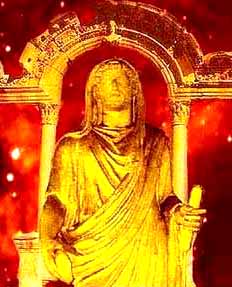
On July 8th and 9th the Religion of Antinous commemorates the Ascension and Consecration of Hadrian. And on July 10th we commemorate his death and Apotheosis.
Hadrian was declared Emperor by the Legions when Trajan died suddenly while campaigning in Parthia on August 8th, 117. Hadrian had been on tenterhooks for years wondering whether Trajan would formally adopt him as his heir. If Trajan died without the issue of succession being settled, it could result in civil war — or at least in the assassination of Hadrian by some other ambitious man.
It is said that the Divine Empress Plotina forged the will of her husband and gave the throne to Hadrian, who had been her protégé and friend for years.
After assuming power, Hadrian first settled the conflict with the Persian King, signing a peace treaty that was to last through the whole of his reign. As Trajan's military representative in the provinces, he had seen how the empire was beginning to over-reach its resources. So he set about consolidating things in the East, lest his Empire become embroiled in the sort of chronic blood-letting that modern superpowers now seek to extricate themselves from in that same region.
It is also said that he wanted to let the political dust settle back in Rome before returning to a city where his critics were waiting. Many thought him unfit. Hadrian was Hispanic — literally so. He was born in the province of Hispania and spoke Latin with a provincial "Hispanic accent" which was the cause of much derision by high-born Patricians when he was sent to Rome as a boy to be educated. He never liked Rome and, throughout his reign, spent as little time there as possible.
Settling other matters in the East, Hadrian waited a full year before returning to Rome, and on July 9th, 118, he entered the Holy City and was formally and ritually installed as Emperor by the Senate. He was then consecrated as Pontifex Maximus, highest priest of the Roman Religion, and head of all foreign cults.
He inherited from the warrior-king Trajan the largest empire that the western world had ever known — Rome at her greatest size and strength — and he wisely chose not to continue to expand the frontiers, but to turn instead to the development of the interior.

He visited every province, traveling more than any other emperor before or after, dedicating his power to art, literature, legal reform and the promotion of peace, prosperity, and the united religious consciousness of Roman citizenship after his beloved Athenian model.
Flamen Antinoalis Antonyus Subia says the following about this Sacred Day in our Liturgical Calendar:
"On this day, Imperator Caesar Traianus Hadrianus Augustus was to assume responsibility as the spiritual leader of the Empire, Father of the Country with a vigor unparalleled by his predecessors, and was to be one of the foremost builders of cities, temples, and public structures world-wide. For his love of Antinous and the extraordinary gesture of deifying our god, we worship and venerate Hadrian as the founder of our faith and as our immortal father, the lover of Antinous."
On July 10th the Religion of Antinous commemorates the Apotheosis of Hadrian. After a prolonged illness, at Baiae, on the Bay of Naples, Hadrian died on July 10, 138. His ashes were placed in the mausoleum on the bank of the Tibur that is now called Castel Sant'Angelo.
After the death of the gentle Antinous, Hadrian became embittered and mistrustful, capricious and cruel. When Hadrian died, the Senate wished to condemn his memory for atrocities committed against them during his final years. But his successor, Antoninus Pius, persuaded them to declare Hadrian a God. A temple was build for him known as the Hadrianeum on the Campus Marius, the remains of which are now part of the Roman Stock Exchange.
Flamen Antinoalis Antonyus Subia explains:
"Hadrian the God is venerated as the manifestation of Jupiter Optimus Maximus on Earth, the ruler and guiding force behind the Antonine Dynasty, the most sacred family of emperors, whose reign is the Golden Age of Rome, because of the peace and prosperity that it maintained, which was the result of the wisdom of Hadrian's far-sighted and divine plan stretching out over the world. We worship and adore Hadrian the God, Savior of the Cosmos."
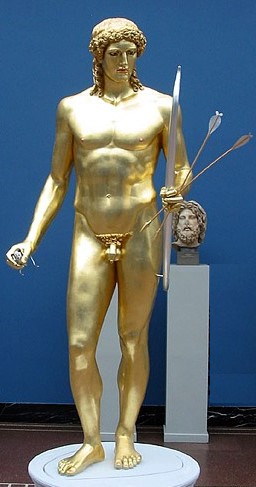
The June Solstice is one of the most sacred days in the Liturgical Calendar of the Religion of Antinous. It is the day when Ra Herakhte, the heavenly father of Antinous, stands still for a moment. In the Northern Hemisphere it is the Longest Day and from now on the days become shorter and shorter. For our brothers in the Southern Hemisphere, this is the Shortest Day and from now on the days become longer and longer.
That is an important aspect to remember about the Religion of Antinous. The Blessed Boy is beyond such constraints as Summer and Winter or even Life and Death. For Antinous, the days are ALWAYS getting longer and the they are ALWAYS getting shorter.
For HE lives in our hearts — wherever we are.
Not only is it perhaps winter or perhaps summer where you live — but the Solstice also coincides this year with the planet Mars leaving placid and boring Taurus and entering flexible and flighty Gemini. Gemini Mars has no tolerance for boredom. So for the six weeks when Mars is in Gemini, you can expect a general desire for variety and change. This will be a great opportunity for you to change mental attitudes and opt for bold new ways of communicating with others. Gemini Mars is also somewhat incautious and reckless and willing to take risks. If you are stuck in a rut, this may be precisely what you need to get unstuck.
The Religion of Antinous celebrates a whole cluster of Sacred Events on this magical day, which we call The Delphinea as a collective term. The Delphinea is the celebration of the beautiful, golden-haired god of light, Apollo, for starters.
And then we celebrate the day that Hadrian and Antinous met and fell in love. But on this date we also celebrate the beautiful boy Hyacinthus.
And we celebrate June 21st as the day in the hot summer of the year 130 AD when the Imperial entourage crossed the Sinai desert and entered into Egypt on the final, fateful leg of that final, fateful journey. A year earlier, on this date, they had entered Ephesus in triumph. On June 21st of the year 130 AD, however, they were entering a drought-stricken Egypt (breadbasket of the empire) where the local populace looked to their emperor for a miracle.
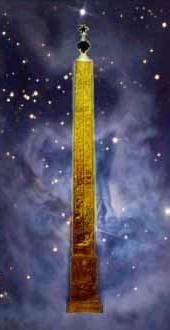
That miracle would occur, but at a terrible price. Antinous would plunge into the Nile and drown. The following season, the Nile would inundate the croplands, bringing bounty and abundance once more to Egypt and, as a consequence, to the hungry empire.
The Bountiful Flood of the year 131 is the first of the many miracles attributed to Antinous the Gay God.
And on June 21st of the year 131, Hadrian would commission the OBELISK OF ANTINOUS, the Egyptian hieroglyphic text of which comprises our religion's greatest single document of faith.
All of these overlapping dates are confusing, of course. But one of the most brilliant modern-day followers of Antinous wrote the following words yesterday on this very topic. A visionary artist living in the San Francisco Bay Area, Kevin Kihn wrote:
"It's my feeling that Hadrian and Antinous are always eternally arriving at Ephesus, at Athens, at all the Hellenic and Hellenistic cities where Hadrian was particularly beloved. Hadrian will always be bereaved and bereft weeping on the shore of the Nile, and always perpetually with his Antinous. For I fancy that time is like a spool or reel of film on which every frame is eternally preserved, and all times past are present even in the now."
But first, let's spool the reel of time back to Apollo and the Solstice! Antinous would be associated with many deities in the generations to come. Among his many names, the Beauteous Boy was adored as Antinous-Apollo.
The glorious image above left shows a modern reproduction of the Apollon Parnopios which has been gilded and fitted with gemstone eyes to show how it might have looked in a temple where a ray of sunlight would have set it ablaze in gleaming light.
The Delphinea is the celebration of the beautiful, golden-haired god of light, Apollo, and of his triumph over the great and monstrous Python which was wrapped around holy mount Parnassus. The Python was the creation of Juno, a creature of jealousy whose coils were meant only to stifle and constrict the grace of that which was to proceed from the Sacred Way of the holy city of Delphi.
Apollo shot the Python and destroyed it, when he was only three days old, which is like the brilliance of the Sun dispelling the covering of night. He set the black stone which had fallen from the sky, called the Omphalos, over the navel of the Earth, and charged a Sibyl, a priestess of the Great Mother to watch over the stone and to convey his wisdom to mankind.
Flamen Antinoalis Antonyus Subia explains the significance for us Antinoians:
"The Oracle of Delphi, called a Pythoness, was overtaken while seated atop a golden tripod, by a fire that is the breath of the God. Apollo is the Flower Prince reborn, he is the Twin brother of Dionysus, the Twin brother of Diana. He is the Son of Zeus, and the inheritor of his Kingdom, just as Aelius Caesar was the chosen son of Hadrian."Apollo is the God of wisdom and art, the speaker of truth, the deliverer of radiance, reason and beauty. Apollo is the God of Socrates and Plato, and he is the God of Pythagoras who claimed to be his son, exhibiting a golden thigh as proof. Apollo is the unconquered light, the full manifested brilliance, power and wisdom of Orpheus.
"Of all the gods, Apollo is the most boy-loving, though the touch of his heart was invariably fatal. He is the genius of the dying boy-gods. We pray to Apollo, the great god of homosexuality, and seek his guidance on this day, the longest day of the year."
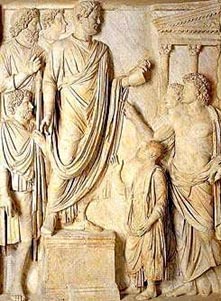
Which segues into the "Incipit Amor". In the year 123, Hadrian toured the Danube region and Asia Minor. It was on this occasion that he met and fell in love with Antinous, in the ancient Bithynian capital city of Nicomedia, according to current research. One portrayal of the event has Hadrian in a garden, surrounded by the youth of the city, hearing a poetry recital.
Antonyus tells it this way:
"Towards the back of the crowd, Hadrian notices a boy of extraordinary beauty who did not bring a stylus and tablet for taking notes, but sat removed from the others, silently gazing into the fountain, contemplating the words of the reader, as if in a dream. Hadrian was captivated, and is said to have gained the blessing of the boy's parents to have Antinous join the court, where there were already other boys of Hadrian's interest. Antinous would have been twelve years old. He was then sent to Rome to attend the Paedagogium, a finishing school for boys. This day marks the beginning of the love upon which our religion is based."
The relief sculpture at right shows Hadrian addressing a crowd with a boy who bears a striking resemblance to Antinous foremost in the crowd, touching the robe of the Emperor.
During the June 21st Solstice, when we celebrate the Delphinea, the Religion of Antinous also commemorates the entry of Hadrian and Antinous into the fabled city of Ephesus in the year 129. Ephesus had 300,000 inhabitants at its peak in the time of Hadrian, and it drew thousands of devotees to the shrine of the goddess annually. Even today, Ephesus is one of the most complete and most splendid ancient sites in the world and still draws thousands of tourists every year. The Great Library of Ephesus, which Hadrian patronized and greatly expanded, has been lovingly restored.
The Temple of Ephesus was one of the wonders of the ancient world. It was consecrated to Artemis, in her Asian element as a Phrygian-Hittite goddess of the hunt, a youthful manifestation of the Great Goddess of Mount Ida and Dydimus.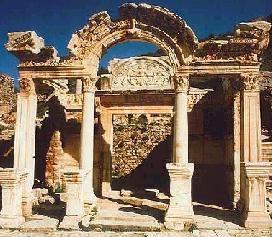
The old Temple had burned down on the night that Alexander the Great was born, but after his conquest, Alexander ordered the reconstruction of the Temple, which was still standing when Hadrian and Antinous visited.
Antonyus Subia explains the parallels between Artemis and Antinous and why we celebrate this Sacred Day:
"Artemis is considered the female Antinous, as his divine twin, the only goddess to exhibit lesbian qualities. She was worshipped as Diana alongside Antinous by the funeral society of Lanuvium. Ephesus was one of the first cities to proclaim Hadrian a living God, and one of the first to adhere to his veneration as a Divus."The presence of Antinous and Hadrian with their very pronounced Artemisian qualities must have made a deep impression on the Ephesians, in that they were aware that the city was being visited by living gods. It is to Artemis of Ephesus that this day is Sacred, as the female twin of Antinous, the Bithynian hunter god."
And on June 22nd the Delphinea concludes when we honor the beautiful boy from Sparta known as Hyacinthus. The astonishing beauty of Hyacinthus and his long, flowing blonde hair was first noticed by Zephyrus, the God of the West Wind. The moisture laden Zephyrus fell madly in love with the boy, and attempted many times to seduce Hyacinth. But every time the boy rejected the wind god, whose breeze is the most lovely and most arousing.
Antonyus relates what happened next:
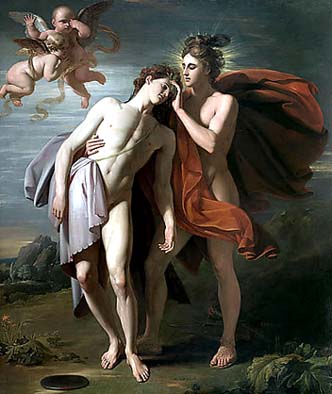
"It was then that Apollo noticed Hyacinthus and fell completely in love with him also. Unlike with Zephyrus, when Apollo revealed his love to Hyacinthus, he was not rejected, but his shining love was returned many fold. The two, who were like twins, whose long, blonde curls, rustled together in the jealous wind of Zephyrus, enjoined a passionate love affair ...
"... until one day, the sight of their happiness proved too much for Zephyrus to endure, and while Apollo and Hyacinthus were throwing the discus together, the wind god sent a gust of air, when Apollo threw the golden disk, causing it to fall directly on the perfect head of Hyacinthus who died instantly from the blow.
"It was all an accident, and a tragedy, but Apollo was beside himself with grief, like Hadrian holding the body of his beloved Antinous.
"The Sun God turned the blood that flowed through the soft curls into the flower that we call the Hyacinth. The Death of Hyacinthus is the divine metaphor for the beauty and tragedy of life taken from the young in their full vigor, falling victim to the accidents of youth. It is also a warning to those who would approach the majesty of the great god Apollo, who is rightfully called the Far-Shooter, and the falling of the golden discus is a sign that the powers of the sun at this time of the year, though at their greatest, are slowly fading. The disk strikes Hyacinth on the head and the days grow shorter."
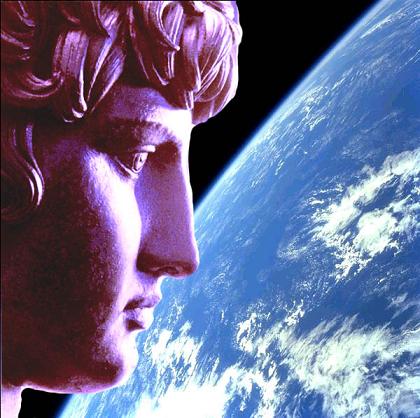
On June 11th, the Religion of Antinous celebrates the Rise of the Star of Antinous. This is the date in our Liturgical Calendar when the Constellation of Antinous begins to rise over the horizon at sunset. It is visible on the eastern horizon along the banks of the Milky Way.
Wherever you live on this blue marble we call Earth, you can see the Constellation of Antinous on starry nights from mid-June through late October when, in synchronicity with the Death of Antinous in late October, the Star of Antinous descends below the western horizon in the glare of the setting sun.
The Constellation of Antinous is no longer recognized by astronomers (just as Pluto has been demoted to the rank of "dwarf planet"). But it is still visible from any point on Earth nestled between Sagittarius and Capricorn and in the talons of Aquila (the Eagle Constellation) representing the Imperial Eagle which carried Antinous to lofty heights.
The most visible identifiers are the three bright stars of Aquila — Altair at the crown of his head, Tarazad, and Alshain. Alshain is derived from Arabic for "Two Friends" which astrologers have cited as a hint as to how to interpret the Sign of Antinous.
The Star of Antinous is however difficult to see. Most people cannot see it at all. You won't find it on any star chart. Like the Star of Bethlehem, it is a mystery and a conundrum about which many theories have been written.
And even if you could see it, the light which reaches your eyes would have left the star thousands of years ago — perhaps about the time that Emperor Hadrian discovered the star.
The simple truth of the matter — and the most beautiful facet of all — is the fact that Hadrian discovered the Star of Antinous with his own tear-filled eyes as he looked skyward in grief after the death of his beloved Antinous. Distraught and weeping, the emperor stood under the canopy of the star-studded heavens and looked up the River Nile towards the spot where his Beloved Boy had died. And he saw a new star which he recognized as a celestial sign that the gods had taken Antinous to be one of them.

You have to realize that Hadrian was a keen astronomer/astrologer himself. He knew the heavens like the back of his hand and he was so adept at casting horoscopes that it was said he had determined the exact hour of his death. He built an observatory at his sumptious villa outside Rome. And the tour of Egypt had brought him into contact with the finest Egyptian magician/priests, one of whom taught him how to cast a binding spell which could give him dream-visions and could also cause someone to fall hopelessly in love with him or — depending on how it was cast — even cause that person to die in agony.
Hadrian was that sort of control freak. Despite the fact that he was the mightiest man on Earth who could send a man to death on a whim (and did so, on occasion), he also wanted control over the future. And he wanted to be able to force someone to love him and never, never leave him.
Much has been theorized about those fateful final days leading up to the death and deification of Antinous and Hadrian's discovery of the STAR OF ANTINOUS.
Yes, much has been written about these events and about Hadrian's obsession with magic and astrology and soothsayers. One of the more fanciful versions was published in a novel in the mid-1950s by the German author Ernst Sommer. Entitled simply Antinous, the novel suggests Antinous sacrificed his own life to save his beloved emperor during the imperial tour of Egypt in the year 130 AD.

The dramatic climax of the plot has Hadrian lying in a villa in Hermopolis, feverish and at death's door after having been bitten by a mosquito. The emperor writhes in bed, calling out Antinous's name. The Empress Sabina and heir-apparent Lucius, jealous but also fearful that the presence of Antinous might further agitate the emperor, issue orders that the boy be kept away from the emperor.
After several daring attempts to sneak into the villa, Antinous is finally put under house arrest aboard an imperial vessel anchored a few miles upstream near the fallen-down Temple of Bes (the future site of the Sacred City of Antinoopolis). Lucius has ordered that he be put in irons to prevent him from sneaking off to visit Hadrian. But the guards cannot bring themselves to place the beauteous boy in irons, in defiance of Lucius's orders. Instead, they merely confine him to his quarters below deck with a single porthole overlooking the nighttime waters of the Nile.
Sensing that the emperor is dying, Antinous realizes his love for Hadrian is boundless and that nothing can keep them apart. Thinking back to his discussions about life and death with Jewish Rabbis, Christian clerics and Egyptian priests of Osiris, he realizes that the day has come. The hour has arrived. It is time to surrender everything he has — in a pure act of love that will transform everything.
He opens the porthole hatch and sees an unusually bright star which seems to beckon. He steps out of his clothes and leaves them (his last earthly possessions) lying in a heap on the floor. He climbs deftly out the porthole and slips quietly into the water.
At the same moment, Hadrian breathes his last breath, to the horror of Sabina and Lucius and the others who are gathered at his bedside. In a state now beyond physical life, Hadrian opens his eyes to see Anubis standing before him with outstretched hands, lifting him out of bed and guiding him away down many dark corridors. At last, Hadrian is taken through a massive portal and into a chamber where Thoth is waiting beside scales placed before Osiris.
Thoth begins the Weighing of the Heart ceremony as Osiris asks who this person is who seeks admittance to his realm. In the midst of the solemn proceedings there is a loud banging at the portal and Anubis announces that someone has arrived to offer his own heart in exchange for the emperor's heart, so that Hadrian might live and walk the earth again. That person is standing unseen just outside the portal. After brief discussion, the Egyptian deities acknowledge that the Law of Maat specifically envisions such an exchange and that, indeed, it is the most sacred and powerful of covenants — surrendering one's own heart on the Scales of Truth for that of a loved one. Such love cannot be denied. The offer cannot be denied.
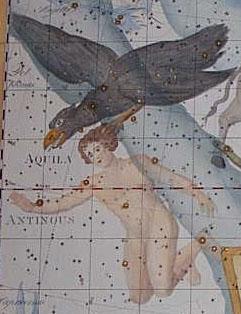
Genesthoi — So Be It Done!
Back at the death bed in the Hermopolis villa, Hadrian gasps suddenly and his eyelids fly open, to the amazement of everyone who thought he had just expired. Sensing what has happened, he speaks hoarsely of a vivid dream involving deities. He looks around and demands to know where Antinous is.
"Where is he? What have you done with him? I know he would be here at my side if he were physically able. Bring him to me at once!"
But as Sabina and Lucius stammer excuses, and before the runners can summon Antinous, a boat crewman bursts into the room with the news that Antinous is missing and presumed to have drowned in the Nile.
Hadrian suffers a relapse, but the Egyptian magic is well done. So he cannot die this time. As the search for Antinous continues, with hope waning each day, Hadrian retreats to the rooftop observatory of the villa in Hermopolis which has been placed at his disposal by a wealthy Hermopolite. The emperor stares into the heavens night after night, refusing to give up hope that Antinous might yet be alive, perhaps dazed and confused and lost somewhere along the river.
Then one night he looks into the heavens and sees the proof that he has been looking for since the disappearance of Antinous. He summons the empress and Lucius and the entire court and also calls for the chief astrologer of the Temple of Thoth in Hermopolis to come quickly.

He informs them that a new star has appeared in the heavens and that it is a celestial sign that Antinous has left this earthly existence to ascend to the pantheon of the gods. He has surrendered everything on behalf of his beloved emperor, just as he had always said he would. Everyone thinks Hadrian has suffered another relapse and is delusional with fever. But the astronomer arrives and swiftly confirms that the sharp-eyed emperor has indeed discovered an uncharted star.
As Hadrian leaves to issue orders for the deification of Antinous, construction of the city at the spot where he drowned and erection of temples throughout the world, the astronomer remains behind in the rooftop observatory with the wealthy owner of the house. Where precisely is this new star, the owner asks. "I know quite a bit about the stars for an amateur, but I can't for the life of me see anything at the spot in the heavens where Caesar was pointing just a while ago."
The astronomer says that the new star is definitely there and that astronomers throughout the world will confirm its existence and it will be recorded duly in all the star charts.
"Yes, but can't you point it out to me?" the wealthy man pleas. "I'm straining my eys looking, but I just can't see anything."
The astronomer answers, "And that is why you will never be a good astronomer. You scan the heavens with your eyes, but not with your heart."
So Hadrian looked into the nighttime skies and discovered a new star to point the way to that new religion. As a scholar and man of science he was able to see it with his own two eyes. Perhaps it was a super-nova which flared and then went out — who knows? He saw it and his court astronomers confirmed it and the Constellation of Antinous was recorded in the star charts for 19 centuries to come.
But more importantly, Hadrian discovered the Star of Antinous shining in his heart. The Death of Antinous showed him a way to make his vision of the perfect religion a reality on Earth. It was the Light he was seeking. It was the Light of Antinous.
So when you look up into the nighttime skies tonight in search of the Star of Antinous, don't be surprised if you can't find it with your physical eyes. You can't find it in physical space, which is why Flamen Antinoalis Antonyus Subia calls it the Dark Star of Antinous. Look inside your heart and you will find it shining there with all the beauty of a dream of perfection ....
Lumen Antinoi Adiuva Nos! (Light of Antinous, Sustain Us!)
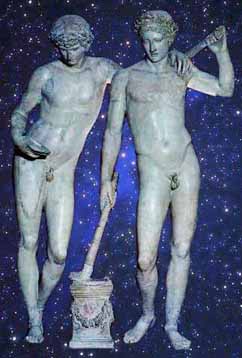
The Sun has entered the Sign of Gemini — the Twins Castor and Pollux, Gods of Homosexuality. This is the zodiac sign which ushers in a special sacred time in the Religion of Antinous, for this is the time of year when the STAR OF ANTINOUS rises, after having been hidden below the horizon since the Death of Antinous at the end of October.
On May 21st the Religion of Antinous honors the Divine Twins, Castor and Pollux. On this date we also honor our Saint Plato, because May 21st is Plato's birthday, and no worshipper of Antinous could possibly forget HIS birthday.
The greatest of all western mystics and philosophers was born on this day in the year 427 BC. He was originally named Aristocles, but was called Plato by one of his teachers because of the breadth of his shoulders and of his speech, and we might also say because of the magnitude of his legacy of wisdom.
He was a follower of Socrates and the majority of his works are written as Dialogues of Socrates, wherein Plato elaborates his vision of the Universe, the inner workings of mankind, the complexities of human relationships, and the virtues of civilization.
All we know about Socrates is in reality only what Plato has told us of his teacher. Out of loyalty, Plato gave all personal credit to the wisdom of his divine teacher. Plato founded the Academy in Athens that was dedicated to the love of wisdom and to the perfection of the minds and souls of young men. Plato studied Pythagoreanism in Italy and made further speculation into the mathematical mysticism of the first philosopher thereby creating the model upon which western monotheism is based. The Platonic system was essentially a unification of the social inquiry of Socrates with the cosmic ramifications of the teachings of Pythagoras.
Here is how Flamen Antinoalis Antonyus Subia explain's the significance of Saint Plato:
"In the vision of Love that Plato expounded, Venus Urania, Celestial Love, is glorified as highest form of human affection, above the earthly requirements of procreation. The love between two men, what is innocently called Platonic Love, was considered by Plato to be the most divine form of relationship. Hadrian, in all ways the most Platonic of all Emperors, the veritable manifestation of the Philosopher King as glorified by Plato in The Republic, was demonstrating the meaning of Venus Urania, for all the world to see, in his passion for Antinous. For the beautiful light in which Plato illuminated the inner nature of homosexual love, he is venerated as a divine Saint of the Religion of Antinous."
But May 21st is also when we honor Castor and Pollux, the Dioscuri who were born as triplets with the beautiful Helen as their sister. The mother of the three was Leda who was seduced by Zeus who came to her in the form of a swan. Leda gave birth to an egg from which emerged Castor, Pollux and Helen.

The identical brothers were inseparable, and had a deep affection for one another, for which reason they were often worshipped as gods of homosexuality. Helen was constantly being abducted and in need of rescue, which the brothers were usually successful in accomplishing, however, her beauty was eventually to lead to the Trojan War.
Castor was a skilled horseman, and Pollux was an unconquerable boxer. They took part in the voyage of the Argonauts, and together with Orpheus were able to calm a storm at sea, for which reason they were worshipped as the protectors of sailors.
Later in the voyage, Castor was killed, and Pollux was so overwhelmed that he begged Zeus to accept his life in exchange for his brother's. Out of compassion, Zeus immortalized Castor and proclaimed that Pollux would spend half the year in the underworld and half the year in heaven with his brother. Together they were placed in the sky as the sign of Gemini.
The Divine Twins miraculously appeared in Rome to announce the victory of the Republic over the allies of the last king by watering their horses in the Fountain of Juturna in the Forum.
Flamen Antonyus has this further insight into Castor and Pollux:
"The sacredness of the Twin Gods, with their third twin sister Helen is found in Norse Mythology as the Alcis and as the twins Frey and Skirnir with their third twin sister Freya.
"The symbolism of brotherly love, and of sacrificing one's life for the immortality of a brother is at the heart of the Religion of Antinous, and is an example of the sacrifice that Antinous is said to have committed for the prolongation of the life of Hadrian. The Dioscuri are Antinous and his "rival" Aelius Caesar, and they are also seen in the two brothers of Hadrian's court, Macedo and Statianus Caesernius, who were servants, protectors, confidants, lovers, friends, witnesses and first priests of Antinous.
"The Sacred Star of Antinous rises during the sign of the brothers Castor and Pollux."
Thus we pay tribute today to St. Plato, who enunciated the philosophy of same-sex love, and to the inseparable Castor and Pollux whose same-sex love is immortalized amongst the stars.
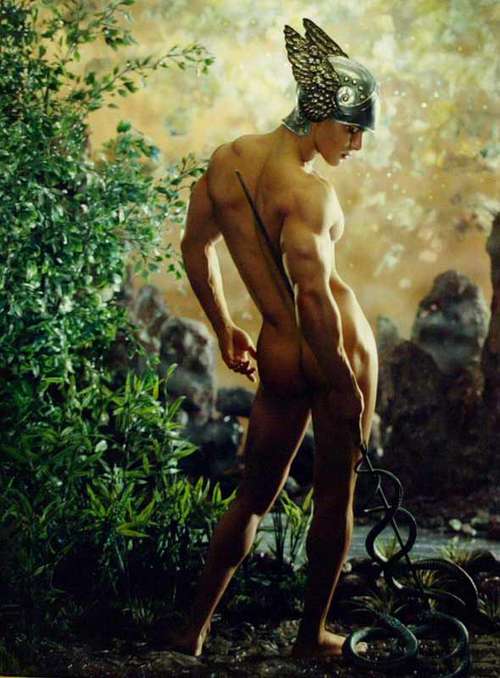
We lift up our hearts to the great wing-footed God Mercury. Father of Antinous, son of Zeus and Maia.
Mercury is the god of speed, the Lord of commerce, communication, and cunning. He is forever young and beautiful, the patron of skilled athletes, especially runners, and yet he possesses the infinite wisdom of extreme old age.
It is highly ironic that this year, Mercury's Feast Day in mid-May occurs as the planet Mercury repeatedly is moving into and out of alignment with Venus, Mars and Jupiter. They will be "conjoining" with each other time and again over the next couple of weeks — creating much beneficence. You may barely see them clustered together along the horizon just before sunrise.
Mercury is the lord of communications and thinking. But he is also the lord of mendacity and scheming. He is the patron of communicators of truth and wisdom and of technological wizards. But he is also the patron of pickpockets and con men and of used-car salesmen.

Look into the eyes of a cardio-surgeon who is about to implant an electronic pacemaker to save your life — and you see Antinous-Mercury's eyes looking back at you.
Look into the eyes of a slimy car mechanic trying to sell you a radiator and battery you don't need ($200 cash in advance, please) — and you see Antinous-Mercury's eyes looking back at you.
Look into the eyes of an incredibly sexy lover when he professes undying love for you — and remember that all things are fleeting, like liquid mercury which beads and runs away. The moment is what counts. Do not live your life in chronic remorse for the past, or in perpetual dread of what might lie in the future. Antinous-Mercury snaps his fingers in your face and says, "Wake up! Snap out of it! Be conscious of every fleeting moment of your precious life. Take my hand and fly with me!"
He doesn't play his tricks on you to be cruel. He plays his tricks on you so that you will learn to use your ingenuity and wits to play the Game of Life — and win.
Antinous-Mercury wields a caduceus entwined with serpents — symbolizing mercurial medicaments — which can cure you or kill you — depending upon how you take them! It is a gay sorcerer's wand which wields awesome power. Whether it harms or heals depends on how you wield it. Antinous-Mercury knows how to wield it deftly and to our advantage.
And right now he is joining with Venus, Mars and Jupiter — to concoct the right potion — sending us the right words for relationships (Venus), assertiveness (Mars) and good fortune (Jupiter).

On May 6th, the Religion of Antinous commemorates the book burnings and the ransacking of the world's first gay scientific institution — foreshadowing the Gay Holocaust.
On this day in 1933, the Nazis stormed and shut down the Institute for Sexual Science which had been founded by Dr. Magnus Hirschfeld in Berlin in 1919. In collaboration with the Scientific Humanitarian Committee, the institute was founded for the research of human sexology, primarily for the purpose of repealing "Paragraph 175", which was the German Law that made homosexual acts illegal.
The work of the institute was a reflection of the widespread gay liberation that prevaled in Germany after World War I. It was specifically targeted by Adolf Hitler as one of the foremost "degenerate depravities of the Weimar Republic" which the Fuehrer vowed to eradicate.
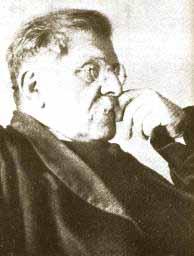
Next week, on May 14th, the Religion of Antinous celebrates the feast day of Saint Magnus Hirschfeld. The man called the Father of Gay Liberation died on May 14, 1935, in exile in Nice, France, an embittered and broken man.
He died on his 63rd birthday. A life that had started out with such lofty ambitions ended in disillusionment. He was of Jewish ancestry and began his career as a medical doctor but very soon devoted his life to the study of homosexuality.
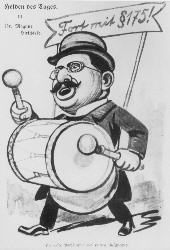
In 1897 he founded the Scientific Humanitarian Committee, which was an organization whose publication, called The Yearbook of Intermediate Sexual Types, was devoted to the repeal of "Paragraph 175", a law passed by the Reichstag in 1869.
The work of the committee included ongoing lobbying supported by the scientific studies of Dr. Hirschfeld into human sexuality. This study culminated in the formation of the Institute for Sexual Science in 1919.
Dr. Hirschfeld spent the majority of his career writing and lecturing around the world on the nature of homosexuality and other "intermediate" sexual types, including cross dressers. The word "transsexual" was coined by Dr. Hirschfeld to describe the phenomenon that he argued was a natural extension of human sexuality.
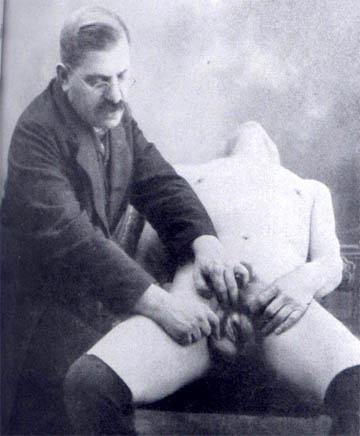
His philosophy centered on the contention that there was a third sex, called the Uranian, which was neither male nor female, but a combination of both that was manifested in homosexuality, which was not to be considered an impure deviation, or even as an illness, but as a natural and phenomenal component of human nature.
For his work, the Nazis targeted Dr. Hirschfeld as an example of decadent Bolshevistic/Jewish influence infecting the purity of the German people, luring the Aryan race into impure and destructive perversity. He was ultimately driven into exile and burned in effigy as an emblem of evil. His institute was ransacked May 6th and his books were publicly burned in a bonfire on May 10th, 1933.
In another ironic twist, homosexual members of Ernst Roehm's SA Stormtroopers (shown above) hurled these books to the flames in 1933 — and would themselves face persecution and death when Hitler turned against Roehm only a scant year later during the "Night of Long Knives" in June 1934 when Hitler decided that Roehm had become a liability.
The storming of the Institute for Sexual Science was the first step in the persecution of homosexuals, who were later sentenced to labor in the concentration camps, the extreme cruelty of which usually resulted in death.
The symbol of the Pink Triangle, the homosexual form of the yellow star of the Jews, was born after the fall of the forward-thinking Institute. It is the symbol of our repression, just as the rainbow flag is the symbol of our freedom. The storming of the Institute was the beginning of the dark ages which were to last until the riot at the Stonewall in 1969.
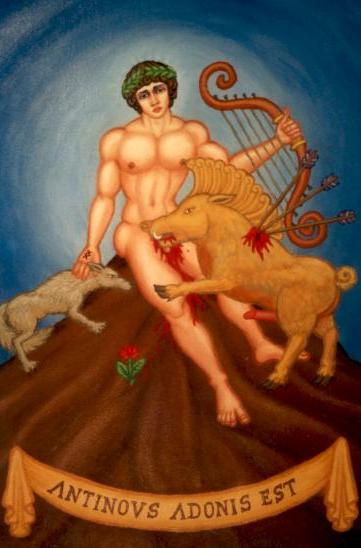
On May 1st the Religion of Antinous commemorates the SACRED BOAR HUNT.
In our Liturgical Calendar, it is the day when Hadrian and Antinous arrive at the sacred city of Bithynium/Claudiopolis, the hometown of Antinous, in the late spring of the year 129. Imagine the jubilant welcome they must have received as the city's populace turned out en masse (including all of the extended family and acquaintances of Antinous) to see the imperial entourage with Hadrian and Antinous at the forefront.
The birthplace of Antinous is the modern-day city of Bolu in Turkey, about halfway between Istanbul and Ankara and not far from the Black Sea.
It was a major city in those days with a Hellenistic/Roman heritage dating back centuries.
Now it is a sleepy health resort. Not too many foreign tourists go there, but the area is a popular with Turkish vacationers because of its pine-covered mountains and its sparkling lakes.
The region is teeming with bountiful wildlife and so Hadrian and Antinous went on hunting forays while in Bithynium.

They are depicted on one of the tondos of the Arch of Constantine, engaged in a Boar Hunt.
The Boar Hunt had deeply mystical symbolic meaning for Hadrian, as exemplified that it was elevated to mythic proportions for use in public monuments.
Flamen Antinoalis Antonyus Subia explains the mythic symbolism this way:
This hunt takes place in the ancestral forests of Antinous, in Phrygia, and its meaning is closely connected to the Mysteries of Adonis, and Freyr. It represents the full vigor of his strength, courage and skill as a hunter.
This festival is a commemoration of the joy of life, in celebration of indulgence and sensual fulfillment. It is the midpoint of the Antinoine year, in direct opposition to the Death of Antinous in October.
The Sacred Boar Hunt represents the pinnacle of the life of Antinous.
The Boar Hunt has other hidden symbolism associated with porcine creatures. Antonyus mentions Freyr which brings in associations with the most magical boar in all mythology — the fabled Gullinbursti — which is a magical spirit being with golden bristles which was presented as a prize gift to Freyr forged from the magical furnace at Valhalla.
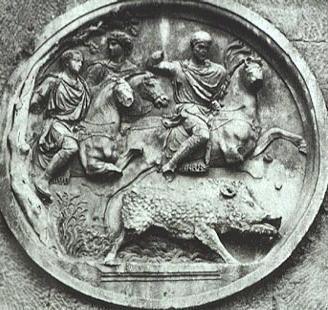
Freyr could ride this fabulous being or hitch his chariot to it. Gullinbursti could plow the earth with his tusks and speed across earth, sea and sky faster than any horse.
Pork has always been a primary source of animal protein for most Europeans, unlike beef in English-speaking countries. Fittingly, pork was the food of the heroes at Valhalla. They feasted each evening on an enormous roast boar, eating and drinking themselves into blissful oblivion. And then, as the heroes slept, the roast boar would be magically restored so that it was plump and juicy and ready for their table the next day when they awoke.
Having pork on the table is still a traditional sign of wealth in many parts of Europe. In Germanic countries, the expression "Schwein haben" (having pork) means "being lucky" or "having good fortune."
If you ever possessed a piggy bank as a child, you were holding an ancient pre-Christian amulet of fortune in your hands. The piggy bank's mystical/magical purpose in life is to provide you with unending sustenance ... forever-replenishing your good fortune.
Hadrian and Antinous stalked and captured their good fortune.
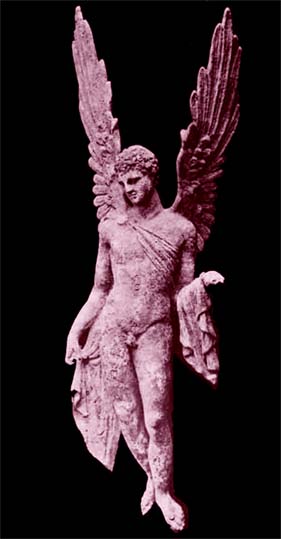
April 21st is a very special date in the Liturgical Calendar of the Religion of Antinous. This is the day we joyously celebrate The Eroticon.
The ancient festival of The Eroticon is celebrated when the Sun moves into the Sign of Taurus the Bull. But this year The Eroticon is particularly special because 2011 IS THE YEAR OF VENUS and both Venus and Mars have entered the fiery sign of Aries in recent days. This Venus/Mars embrace sends out erotic sparks which will be energizing all of us.
Flamen Antinoalis Antonius Subia knows best what to say on this special day, and I defer to him. I will only mention the highlights for the many new followers of ANTINOUS THE GAY GOD, based on the LITURGICAL CALENDAR.
On this day we honor the great God of Love, Eros-Cupid, in his guise as Antinous-Phanes, the "radiant being of light who emerges from the egg of night".
We also honor the Great God Priapus the divine phallus, the column of male virility, the bestower of the fertility of fields, vineyards, orchards and gardens. Priapus is the axis of the cosmos.
On this date we also commemorate the founding of the city of Rome, Natalis Urbis, personified by the Romans as Our Lady Roma. We celebrate the consecration of her sacred border, and of her birth, and eternal life, and remember that we are her children and we remember the hieroglyphs on the OBELISK OF ANTINOUS which hint at the location of the Lost Tomb of Antinous:
Antinous the God is here!
He rests in this place
Which is in the Border Fields of Our Lady Rome.
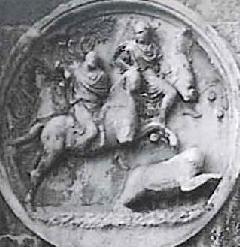
And also on this date we remember the Sacred Bear Hunt. While in Mysia in Asia Minor, in the year 129, the court engaged in a Bear Hunt near the city which Hadrian had founded (on an earlier trip) called Hadrianotherae, "Hadrian's hunting ground". It is the modern-day city of Balikesir in a lovely area of wooded forests and lakes in northwestern Turkey.
Hadrian loved animals and is known to have built tombs for his dogs and horses (according to Royston Lambert) and he loved to hunt. Unlike the popular stereotype today of the blood-thirsty hunter who shoots anything that moves, Hadrian was a hunter in the ancient shamanic sense of the word. The same way that the native peoples of North America were. The way that aboriginal peoples everywhere still are. He identified with his prey and understood it and became one with it. Hunting was a form of sacred devotion to Hadrian.
The Bear is the sacred animal of Diana-Artemis, and symbolizes the solitary, forest-roaming character of the Virgin Huntress. In the ferocity of the bear lies the secret of Diana's power, against which Hadrian and Antinous pitted themselves, as shown on the tondo (at right) from the Arch of Constantine.
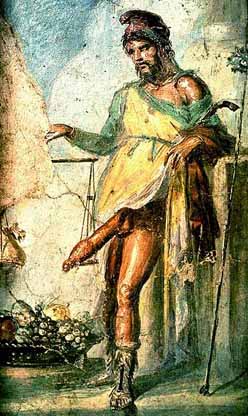
The grand themes of the Eroticon are Love and Sex and Ferocious Anger. The Beast is always lurking inside of us. The mystery teaching surrounding the Bear Hunt involves getting to know your animal instincts — sex and lust and rage — and to become one with them and to turn them into powerful allies for your spiritual development.
Sex and Anger can be powerful allies, since they are filled with energy that we can harness and use to create change in the world. They are two of the most cathartic emotions, and they can also be very effective cleansers of the emotional system.
However, when rage becomes a habit, it actually loses its power to transform and becomes an obstacle to growth. Identifying the role anger plays in your life and restoring it to its proper function can bring new energy and expansiveness to your emotional life.
It is when anger has no outlet and morphs into resentment that it carries with it the potential to cause great turmoil. Like a cornered bear, it turns into a killing machine.
Our feelings — rage, sexual lust, fear — can sometimes present a very challenging aspect of our lives. We experience intense emotions without understanding precisely why and consequently find it difficult to identify the solutions that will soothe our distressed minds and hearts. Yet it is only when we are capable of hunting down our feelings and understanding them and communing with them that we can tame them by finding an appropriate resolution.
We retake control of our personal power by becoming courageous enough to articulate, out loud and concisely, the essence of our emotions. Like a hunter, we spear it and take it home with us instead of allowing it to remain a wild thing which spreads fear and havoc.
Our assuming ownership of the "bear within us" in this way empowers us to shift from one emotional state to another — we can let go of pain and fear and rage and upset because we have defined it, examined the effect it had on our lives, and then we spear it and make it our own. By naming our feelings, we claim the right to divest ourselves of them at will.
Hadrian understood the mystical meaning of the Sacred Bear Hunt.
Flamen Antinoalis Antonius Subia has expressed this mystical mystery meaning as follows:
Antinous, under Hadrian's guidance, was an accomplished hunter, indeed it is perhaps his natural skill and bravery in the chase that elevated him to the absolute love and adoration of Hadrian. The Emperor was madly in love with hunters, and Antinous was one of the best. Antinous had perhaps been silently stalking and hunting the Emperor's favor for quite some time, and now, in Asia, in the sacred Hunting Grounds of Hadrian, Antinous closed in on the heart of his prey and captured the Emperor completely. In our commemoration of the Sacred Bear Hunt we recognize that Artemis and Antinous are twin deities, and we seek the Dianic-Artemis-Bear within ourselves.
When we become one with the "bear within us" and when we become one with all our animal instincts and powers (the "monkey" inside us, as Antonyus calls it) then we can harness their power to become one with the Great God of Love, Eros-Cupid, foremost of the Gods of the Religion of Antinous. He is the first impulse upon which the world was created, and he is the beauty and perfection of all creation.

IN what is being heralded as a breakthrough for India's transgender Hijras, a blockbuster Bollywood all-dancing, all-singing melodrama about Hijras will premiere later this month for release worldwide this summer.
The Hindi-language film "QUEENS! — Destiny of Dance" , which seeks to portray Hijras in a realistic approach, is set to have its all-India release on April 29th. Music singles from the soundtrack are already available for download.
The story is told through the eyes of a young Hijra named Mukta, the archetype of Hijras — the most beautiful, the best dancer in the community, a natural leader whom all the other girls look up to. She is potentially the next Amma (Hijra mother) of the community.
That is ... until the arrival of a total stranger into their midst — a young 16-year-old whom Amma names Nandini. Right from the outset, Nandini is an enigma and a mystery — where has she come from? Did someone send her? And if so, what is the purpose of her arrival?
And what really is she? Is she in actuality a goddess, as Amma resolutely believes her to be? Is she a female? Is she male? Is she Hijra?
Director David Atkins says he hopes to celebrate the Hijra way of life using the metaphor of a colourful dance of destiny.
Most importantly, the film co-stars Laxmi Narayan Tripathi, possibly the most prominent Hijra in the world. A Mumbai Hijra who has appeared in documentary films and on TV talk shows to demand Hijra rights, Laxmi has in the past said that the Hindi film industry mocks transgender people. It is high time that Bollywood should bring Hijras to the big screen.
The transgender activist and Mumbai socialite made the announcement at the music launch of the film.

Laxmi (photo right) told Hindustan Times: "I was approached for the movie in 2000. But work only began two years ago. Many incidents in the film have been inspired by real life stories. Hijras have been stereotyped and mocked in Bollywood. There is more to us than clapping hands and loud make-up. This movie will portray the real struggles we go through."
A celebrity in her own right, Laxmi (also spelled Lakshmi) is known to be a close friend of the film's leading actors Celina Jaitley and Salman Khan.
The 31-year-old Hijra said that the aim of the film is to bring more empathy and tolerance towards the transgendered community.
"Transgenders are looked down upon by the society, so their parents are also forced to discriminate openly," said the actor/dancer. "They have no choice but to work as bar dancers and prostitutes due to the unavailability of other work."
As for the success of the film, Laxmi said she will only sense it when the Hijra community is given equal opportunities to education, housing and employment.
"My involvement for the betterment of the Hijra community will continue till the day I die," the transgender activist vowed at the music launch of the Bollywood film in which she co-stars.
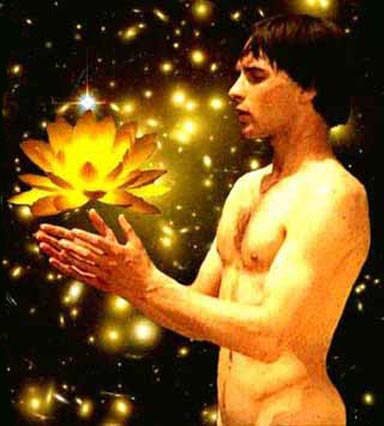
By the time you awoke on Tuesday, Neptune had "come home" to Pisces — completing its 165-year orbit around the sun. This is where dreamy Neptune feels at home — it is where dreamers dream truly great dreams. The last time Neptune passed through Pisces was in the mid-1800s — when slavery ended in the United States and when the dream of gay rights was first dreamt by the first pioneering gay activists such as Karl Heinrich Ulrichs, John Addington Symonds and Edward Carpenter — men who dared to stand up for gay human rights.
Amidst all the strife and chaos in the world, as symbolized by the nuclear meltdown at Fukushima and the political meltdown in Arab lands (and in the US and UK for that matter), Pisces Neptune is dissolving boundaries to help us all to dream the ultimate dreams — the essence of the divine.
You can't grasp the essence of the divine. People spend their lives trying to grasp it. But ultimately, that IS the essence — ungraspability.
Most people don't even try to grasp it. Their minds and their hearts are closed to the divine essence for the most part. Occasionally, they see a glorious sunset and get a hint of it. Or they stand in a the ruins of a Greek temple and sense it vaguely. Or they hear music and their spirits soar briefly towards that divine essence ... for an instant ... before it vanishes out of grasp.
Most people are blind to the divine essence (symbolized by Pisces Neptune). Most people react with distrust, doubt, angst and skepticism. They would much prefer a soulless clockwork world without any hint of the essence of the divine.
But some of us sense that that is not "reality". And it pains us terribly. We wonder what the point is. We wonder if that is all there is — just a mechanical universe ticking like a watch.
And now Neptune dives into Pisces and begins dissolving all the boundaries of our minds and our hearts so that those boundaries become absorbent like the membrane that makes up the walls of the cells of our bodies. The prison walls we have constructed around our hearts and minds begin to become porous — and these prison walls begin to dissolve.
And we begin to dissolve into the Divine Essence. HOMOTHEOSIS — Gay-Man-Godliness-Becoming-The-Same.
ANTINOUS THE GAY GOD is not "out there" somewhere. We are He and He is us.
This is a difficult concept to grasp. Indeed, it is ungraspable. You cannot grasp it with your mind. It cannot be grasped with logic. It cannot be put into words. You just have to dive into it and let it dissolve all the boundaries.
The best way to do that is to find a quiet time and a place where you can be alone — and where you can just let go. Don't think. Don't try to do anything ... just let go. Let go of everything and discover the divine essence. This divine essence is you — has always been you — will always be you.
HOMOTHEOSIS.It takes practice. It is not easy to let go. But it is also not difficult. You just ... let go ....
And the more proficient you become at doing this ... just letting go ... the less you are perturbed by everyday setbacks and the less you struggle against your everyday life.
You begin to discover a grace and (yes, even) happiness that no one can ever, ever, ever, ever, EVER take from you.
I am glad that we are all embarking on this journey — into the deep and dreamy waters of Pisces Neptune — back home again.

The rugged northeast English/Scottish landscape is the backdrop for a Hollywood blockbuster which gets a gladiator arena "thumbs-up" from this reviewer for its masterful story of two men in search of a Roman legion said to have disappeared in the barbarian reaches north of Hadrian's Wall.
The Eagle by Oscar-winning director Kevin Macdonald is historically accurate while being superbly acted and photographed. Combining sword action, master-slave pathos and plenty of piety to the gods, this is a faithful film version of The Eagle of the Ninth, the classic historical novel that has enchanted boys (and girls) around the world for more than half a century.
The Rosemary Sutcliff novel was inspired by the disappearance of the Legio IX Hispana (Ninth Legion), said to have vanished after the soldiers marched north from Hadrian's Wall to battle Caledonian tribes in 117 AD.
Channing Tatum (right) commands not only a garrison but also the movie audience's attention as the young Roman centurion called Marcus Aquila goes beyond Hadrian's Wall in his quest for the truth about the disappearance of his father's legion in the year 120 AD.
He is accompanied by his trusty British personal manservant slave named Esca, played with aplomb by Jamie Bell (below left) of Billy Elliot fame. Donald Sutherland is perfect as Marcus's sage old uncle Aquila.

Openly gay, Tony Award-winning actor Denis O'Hare (3,000-year-old gay vampire Russell Edgington in the True Blood TV series) skilfully handles the role of a cynical outpost officer whose initial skepticism turns to admiration when the young centurion saves not only the garrison but also the lives of Roman hostages held by bloodthirsty British "savages".
Marcus and Esca set out across Hadrian's Wall into the uncharted highlands of Caledonia — to confront its savage tribes, make peace with his father's memory, and retrieve the lost legion's golden emblem — the Eagle of the Ninth.
On the other side of the wall, Marcus and Esca trade places as master and slave, and both men must learn to trust each other in spite of daunting odds. One false word about who is actually master and who is slave — and both might meet instant death at the hands of wild Pictish warriors who possess the golden eagle as a pagan fetish.
The story of the two men's bonding, the loving friendship that grows between them and the very unlikely men who join them in their crusade is a moving and poignant piece of cinematic art.
This film has been called "the thinking person's Gladiator," and that assessment is entirely accurate. While there is plenty of beheading and general blood-letting, there are also tender moments of reflection on the themes of honor, self-worth, dignity, courage and the common bond between all human beings.
Sutcliff wrote in the foreword to her famous book that her story was based on the disappearance of the Legio IX Hispana and the discovery of a wingless Roman eagle standard centuries later in the Scottish borderlands.

The disappearance of the legion is disputed by some historians because documents suggest it fought elsewhere in the Roman Empire after its supposed "demise" in Britannia. Many authorities believe the Ninth Legion was annihilated some years later in the eastern part of the empire, not in Scotland. They also differ with Sutcliff's theory that the legion was comprised of Hispanic soldiers. Some modern experts suggest the legion was called "Hispanic" because it won a decisive battle in Hispania.
But no one knows for sure, and the mystery surrounding the disappearance of the Ninth Legion has endured for 1,800 years. The book, published in 1954, sold more than one million copies and was made into an acclaimed BBC mini-series in the 1970s starring young Anthony Hopkins as Marcus.
For the new film, Anthony Dod Mantle, who won the Academy Award in 2008 for his cinematography of Slumdog Millionaire, was director of photography. His ceaselessly moving camera gives the audience the feeling of sharing the journey of Marcus and Esca every step of the way. The austere Caledonian beauty is hauntingy spooky and ominous, heightening the sense of drama.
The motion picture's scrupulously accurate costumes are by 2009 Academy Award winner Michael O'Connor. And the breath-taking production design was by Academy Award nominee Michael Carlin. The film's editing, by Justine Wright, makes the battle scenes intensely dramatic, so that you feel you are in the midst of the confusion and terror of a battlefield.
The new movie rides the crest of a wave of high-profile Roman-themed hits, including Russell Crowe's film Gladiator and HBO/BBC drama mini-series Rome.
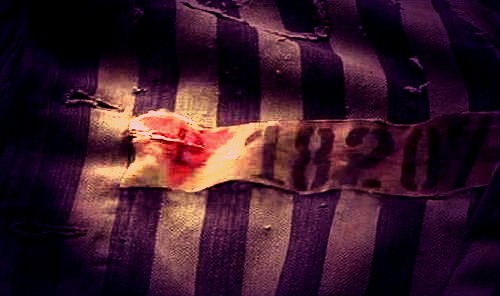
This is the day we honor The Men with the Pink Triangles — the gay men who were persecuted by the Nazis. Jews were forced to wear a yellow star. Gays wore a pink triangle.
Antinous stands for all of us. He stands for the good times of being gay. But he also stands for the horrible times when we plunge into the depths and drown.
Antinous is the spirit of gayness in all of us. Antinous was thus all the Men with the Pink Triangles.
Everybody knows that gay men were persecuted by the Nazis. But only recently, shocking new documents have come to light showing that the Nazi crackdown on gays was even more widespread and insidious than previously believed.
After German unification hundreds of thousands of case histories were released and historians have been sifting through them. Their findings are just now being published. And the findings have shocked even many historians who knew that atrocities had occurred, but were surprised by the extent of them.
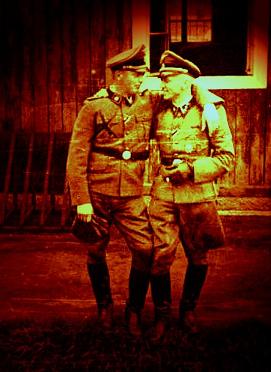
The Gestapo launched a systematic crack-down on gays in the mid-1930s. They actively entrapped gay men. They set up spying stations behind one-way mirrors in public toilets. Plainclothes men patrolled parks.
The Gestapo created a vicious protection racket that allowed gay bar owners to remain in business, under condition that they handed over names of customers on a regular basis. If a patron got drunk one night and said something catty to the bartender, the next day he found himself being interrogated by the Gestapo, who already had a big dossier on his activities going back years.
Landlords were bribed to inform on tenants. If someone at work didn't like a bachelor co-worker, all he had to do was to go to the Gestapo and suggest a sexual advance had been made, and the next day the co-worker would be gone.
It mattered little whether there was any truth to the allegation. Everyone knew that Nazi ideology demanded procreation to produce a Master Race of blond and blue-eyed Aryans. Anybody who didn't get married and sire lots of kids was already practically a criminal. Being a bachelor automatically made a man a suspicious character in Nazi Germany.
Paradoxically, and cruelly, gay men were offered the alternative of "voluntary castration" with vague promises of leniency. In return for naming names of every gay man they knew, they would undergo botched operations that left them with oozing wounds. And they would still end up in concentration camps.
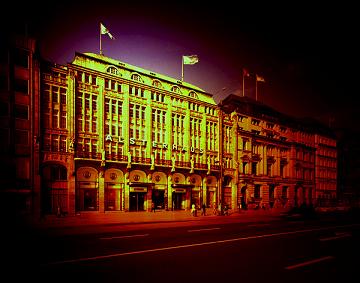
Right here in the German city of Hamburg, where I have lived for nearly 30 years now, there is a macabre Gay Holocaust Walking Tour. It starts in front of the city's biggest and most venerable department store, Alsterhaus, on the city's main street, overlooking a lake and a park which has been a prime gay cruising district since at least the 18th Century. In the 1920s Hamburg was a gay paradise. English writer Stephen Spender described in detail the pleasures of cruising for "seafood" in Hamburg port-side gay bars around 1930.
Like all department stores, Alsterhaus had a large gay clientele as well as a large gay staff. It was at Alsterhaus that the gay pogrom in Hamburg started. It was in the summer of 1937. Gestapo men in leather trench coats entered the store during business hours and rounded up about 40 gay employees, who were hauled off in vans waiting out front on the street facing the park and lake.
The raid followed months of investigation. Co-workers, bar owners and neighbors had informed on the men, who had been tailed surreptitiously. They went to work that bright summer's morning at their perfume counters, and sorting ribbons in the notions department, at their desks in accounting and personnel — not realizing they were about to be hauled off to their deaths.

What followed was weeks and months of "protective custody" and transfers to mental asylums for "curative treatment" and eventual sentencing to concentration camps.
Many were still wearing their pink triangle patches on their prison uniforms as late as 1946 — because post-war courts had upheld their Nazi-era convictions for "unnatural behavior," despite the fact that all other Nazi-persecution convictions were dropped. Some men were still in prison in the early 1950s.
The Alsterhaus department store raid was just the beginning. Raids occurred with growing frequency in the late 1930s.
The newly revealed documents show that the raids in Hamburg were repeated all throughout the Reich. In all, 54,000 gay men died at the hands of the Nazis in Germany, 7,000 of them in Nazi death camps.
The gay historical walk through Hamburg takes you past one-time gay bars and gay-owned businesses, past the Gestapo headquarters and past a publishing house that specialized in gay magazines. Imagine my shock when, during the walking tour, the tour guide held up one of those old 1930s gay magazines and the cover photo was of a bust of Antinous. It was one of the few copies of the magazine that was not confiscated and thrown on a pyre and burned to ashes along with other "decadent" literature.
With Prussian thoroughness, the Nazis documented every detail of the lives of those they rounded up. Those documents provide chilling insights into a hitherto unknown story.
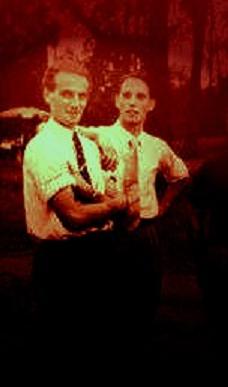
There was the case of August Huenfeldt, a 26-year-old man who, according to the court documents, had played with dolls and dressed up as a girl "in perverted games" as a boy. He rented a room from a married couple in an upper-story apartment in the center of Hamburg. Since bars and parks and public toilets were too risky, he preferred to bring his boyfriend back to his room, where they locked the door and kept their voices low as they had sex.
But unbeknown to them, their friendly landlady and her husband, Herr and Frau Schmuck (nomen est omen!), both about 25 and "like brother and sister" to Huenfeldt, would sneak up to the door to his room. Using a chair, they would peer through the transom above the door and watch the two men having sex.
The Schmucks took notes. They called the Gestapo and handed over their notebook with lurid descriptions of the goings-on in that room.
The Gestapo arrested Huenfeldt but had no name or address for his friend. So the Schmucks were told to set a trap for him. A few days later he came to them saying he had not heard from Huenfeldt for some time. They said Huenfeldt had just stepped out but would be right back, if his friend would care to wait in his room for Huenfeldt's return.
The Schmucks showed him to the room, and then locked the door behind him and notified the Gestapo that the trap had sprung shut. He was hauled off a few minutes later.
The Gestapo had only circumstantial evidence, the hearsay provided by the Schmucks. But in the twisted mindset of the Nazis, the word of a married couple carried weight over that of unmarried men who met behind closed doors. Under torture, of course, both men admitted everything.
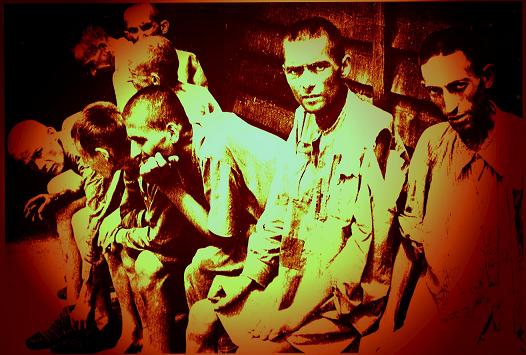
And under torture, and under "promises" of leniency, gay men informed on each other. Oftentimes, gay men were told their friends would come to no harm and that, on the contrary, perhaps their friends could put in a good word on their behalf.
It was all lies, of course. Every name was followed up with Prussian precision. Everybody who was named was also rounded up and tortured to squeeze out more names and more "confessions. " Protestations of innocence were useless. After all, who could believe a pervert? Hitler himself had used that argument in court-martialing one of his generals after being informed of a rumor that the general was homosexual. The general swore on his "word of honor as a Prussian officer" that he was not homosexual and it was all a frame-up. But Hitler reportedly said, "Such low-life scum perverts have no honor to swear by!"
One of the most chilling cases was that of Carl Bruns and Heinrich Roth, a gay couple who ran an upscale men's clothing shop in downtown Hamburg — right across the street from Gestapo headquarters.
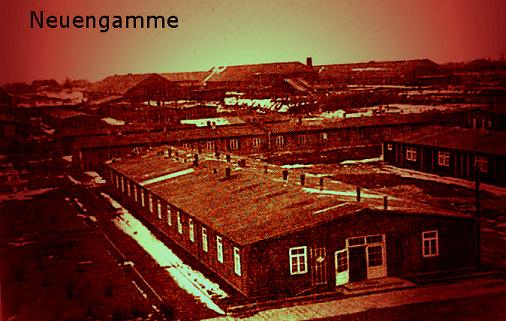
Bruns and Roth were well respected. They lived together with Bruns's elderly mother in an expensive apartment overlooking the lake in Hamburg. Schildt was a professional photographer and did all the advertising shots for the shop as well as taking snapshots of him and Bruns on summer excursions with Mama Bruns.
It is unclear that Bruns and Roth, both middle-aged in the 1930s, ever engaged in any behaviour that would come to the attention of the Gestapo. But their shop was right across the street from Gestapo headquarters. So they couldn't escape scrutiny.
Bruns and Roth were arrested in 1940 and were sent to the infamous Neuengamme concentration camp near Hamburg where a majority of the inmates wore the Pink Triangle badge. Neuengamme had one of the Third Reich's largest homosexual inmate populations. Gay inmates from throughout the reich were sent to Neuengamme. By some miracle, both men survived until the May 1945 when the camps were being liberated by Allied forces.
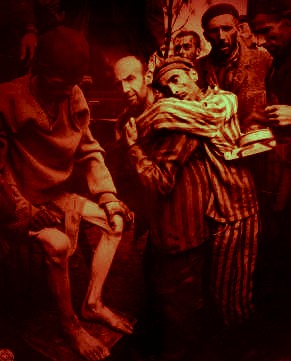
That's when the final tragedy struck for Bruns and Roth.
Auschwitz was liberated by the Red Army on January 27, 1945, and the pictures of skeletal camp inmates shocked the world. In response, Heinrich Himmler issued an order to all camp commandants that they were to ensure that no camp inmates should ever fall into the hands of Allied forces. He didn't specify what they should do, leaving it in the hands of camp commandants.
Some commandants at Dachau and other camps began gassing all surviving inmates so that none would be left alive. Others began evacuating their inmates.
Thus Bruns and Roth were forced to leave the Neuengamme concentration camp near Hamburg on a forced march to the Baltic Sea, 100 kms (60 miles) away, where the converted cruise liner Cap Arcona was at anchor.
This was in mid-May 1945. Hitler was dead. The Allies were advancing on all fronts. Everyone knew that the war was over. All the inmates had heard the news. British forces had dropped leaflets saying they would be in Hamburg within hours.
And yet these men were sent on a Death March to the sea. Stragglers were machinegunned to death. Others collapsed and died of exhaustion. Bruns died along the way. Roth made it to the Baltic Sea docks where the Cap Arcona was waiting and he was herded aboard along with thousands of other inmates.
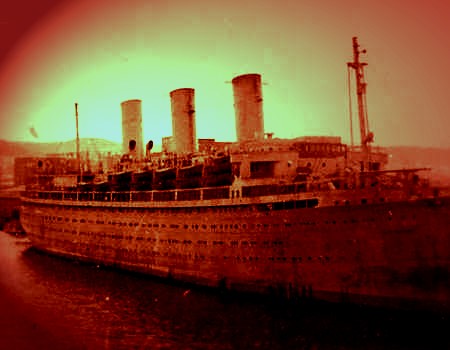
It was May 19, 1945. The British RAF was conducting intensive air raids to pave the way for ground forces, which were only a few miles away. RAF fighter-bombers had been told that Nazi officials were seeking to flee Germany aboard a big ship disguised as a refugee vessel.
The RAF planes came in and bombed and strafed the Cap Arcona, setting it ablaze and sending it to the bottom. Those inmates who managed to dive into the water were either killed by the bombs and strafing from the planes or else were machinegunned by Gestapo men as they tried to climb ashore — after all, the Gestapo had orders to make sure no camp inmates fell into the hands of the Allies.
A handful found shelter in reeds along the shore and were found shivering in the water by British soldiers a few hours later.
The Cap Arcona had been the last bombing raid of the war in Europe. Schildt, the photographer-haberdasher from Hamburg, didn't survive it.
Just one final note to this sad story. The big department store in the center of Hamburg where the pogroms against gay men started in 1937 was recently renovated. When construction workers peeled away a 1950s false ceiling on the top floor of the store, they discovered a beautiful stained-glass skylight which arches over the central atrium of the store which had permitted sunlight to cascade down six floors to the ground floor lobby.
The skylight, designed by artesans before World War I, is composed of stained-glass panels depicting the Constellations of the Heavens in vibrant colors. The name of each constellation is written in flowing script. And there — just below the Eagle — is a small constellation inscribed ANTINOUS in bold and flowing letters.
Antinous saw it All. Antinous WAS the Men With the Pink Triangles.
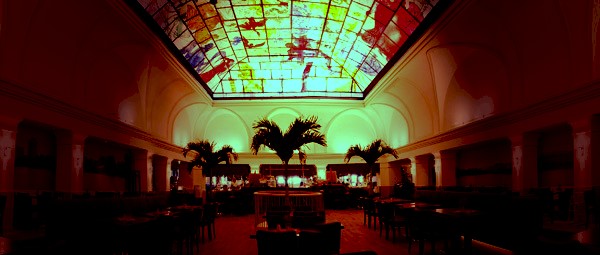
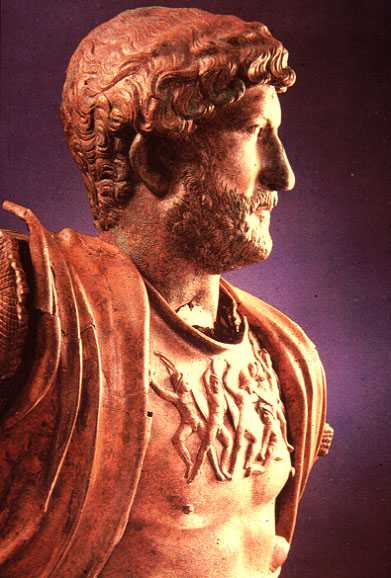
On January 24th the Religion of Antinous joyfully celebrates the Birth of Hadrian.
It was shortly after his birthday in the year 132 that the Imperial Astrologers first sighted the Star of Antinous and informed Hadrian of the new light in the sky.
Flamen Antinoalis Antonyus Subia explains why we celebrate the birth of Hadrian:
"He is the prime deity of the imperial cult as recognized by Ecclesia Antinoi. He is the representative of Zeus on Earth, emblem of the ruler of the cosmos, the great eagle. Hadrian is the leader of the Archons, the bringer of order out of chaos, founder of our religion, he is the divine lover of Antinous, our model and god.
Many historical novels have been written about the story of Hadrian and Antinous. (Indeed, some members of our group ECCLESIA ANTINOI are writing novels right now.) A few years ago, a good friend of our group, the Italian-American historian/novelist Ben Pastor, wrote a novel about the search by Aelius Spartianus (Hadrian's biographer) for the LOST TOMB OF ANTINOUS. The book is entitled "The Water Thief" and is not only historically accurate, but also has some wonderful gay characters and a page-turning plot full of murder, intrigue and plenty of ironic wit.
If you like the novels of openly gay author Steven Saylor (a favorite author of many in our group), then you will enjoy "The Water Thief".
If you haven't read the historical novels of Steven Saylor, you definitely should. His "Gordianus the Finder" murder mysteries are a superb recreation of Rome during the turmoil of the final years of the Republic. And Steven's 800-year epic history entitled "ROMA" is a classic, vividly telling the story of the Eternal City from Romulus and Remus up to Augustus.
I wish Steven Saylor would send one of Gordianus's great grandsons to investigate the mysterious death of Antinous!
In fact, just the past year, another friend of our group, the Australian author George Gardiner, published a riveting historical novel in which Suetonius is called upon to be the sleuth who investigations the death of Antinous. His novel "The Hadrian Enigma: A Forbidden History" is a historically accurate and loving account of that fateful journey up the Nile in the year 130 AD.
Scores of novels about Hadrian and Antinous were written in the 19th Century and early 20th Century, particularly in Europe. One of those novels was written back in the mid-1950s by a German author named Ernst Sommer and has never been translated into any other languages. It is simply entitled "Antinous" and, while it is not very historically accurate, it presents a very moving and inspiring tale of the love between Hadrian and Antinous.
The author, Ernst Sommer, specialized in military-history novels and he was intrigued by Judaism and its influence on Western Civilization. He was forced to flee Nazi Germany because of his unbiased treatment of Jewish themes — basically, because he was not rabidly anti-Semitic. He wrote several books in exile about the horrors of capricious dictators, and so it was only inevitable that he would be drawn to Hadrian as an example of a ruler who consciously attempted to avoid capriciousness, though perhaps not always successfully.
By the time he wrote "Antinous" in the mid-1950s, Sommer was nearly 70 and he used the novel to incorporate all his views about the intricately complicated relations between Hadrian and the Jewish people (and early Christians) in the 2nd Century AD. Sommer plays fast and loose with historical facts and condenses the whole relationship between Hadrian and Antinous down to a single year. In his novel, Sommer portrays Antinous as Hadrian's undercover go-between and liaison agent with radical Jewish leaders and rabid Christian mystics. The idea is that nobody could possibly take exception to gentle and beautiful young Antinous, so that he could serve as the emperor's eyes and ears in a way that a Roman emissary never could.
In the novel, it is through his contacts with Alexandrian Jews and Christians in the autumn of the year 130 that Antinous comes to the heart-felt realisation that Roman logic and discipline only go so far, and that there are some matters of the heart which are worth dying for, and that one man's sacrifice of his own life (whether he is actually The Messiah or not) can change the lives of everyone around him even after he has been dead for generations.
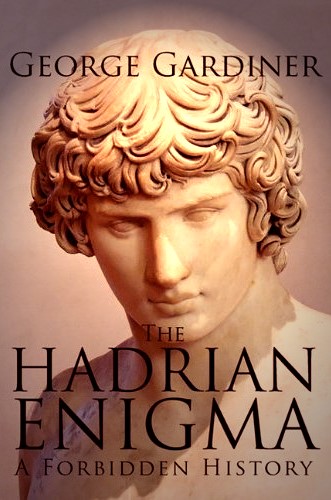
One key element of the novel's plot is the fact that Hadrian and Antinous never have sex. Everyone assumes they are having sex, and it is discussed at length by other characters in the course of the book. But there is no sex between the two. Antinous balks and refuses to be "taken" by the emperor. Hadrian begs. He pleads. He says, "I know you love me more than anyone else loves me. You are the only human being in the world who truly loves me. Why won't you express it physically?"
But Antinous steadfastly refuses, saying he is not prepared to go all the way, that carnal relations would sully the purity of the love they share. He says flatly that as emperor, Hadrian can take his body any time he pleases. To which Hadrian sagely says he does not want to take Antinous's love by command. He wants to receive it as a gift.
"Then you must be patient with me," Antinous replies tenderly. "I want it to be a beautiful gift that I give to you willingly. It must be the perfect day, at the perfect hour, under the perfect star. And then, when that hour comes, we shall both know that the time is right. And I shall surrender to you all that I have to give."
There are several nice passages in the book, starting off with a scene early on when Hadrian anxiously awaits the arrival of Antinous, whom he had seen on a roadside in Bithynia some weeks earlier. Hadrian is now in Antioch and, unable to forget this roadside vision of beauty, he has sent runners to fetch Antinous and bring the boy to him. At last a messenger informs the emperor that the boy has arrived, and Hadrian interrupts an audience to rush off to his private study to receive Antinous — worried sick that his memory has deluded him into thinking the boy was better-looking than he might actually turn out to be when seen close up.
Then the door to the study is opened and the youth is admitted and Hadrian exclaims in joy and grabs him by the arm and pulls him toward a chair by the window so that he can sit down and get a good look at Antinous standing in front of him. And, wonder of wonders, Antinous is even more beautiful than he had imagined.
There is a nice dream sequence in the book as well. It comes at the dramatic climax of the plot as Hadrian lies in a villa in Hermopolis on the banks of the Nile, feverish and at death's door after having been bitten by a mosquito. The emperor writhes in bed, calling out Antinous's name. The Empress Sabina and heir-apparent Lucius, jealous but also fearful that the presence of Antinous might further agitate the emperor, issue orders that the boy be kept away from the emperor.
After several daring attempts to sneak into the villa, Antinous is finally put under house arrest aboard an imperial vessel anchored a few miles upstream near the fallen-down Temple of Bes. Lucius has ordered that he be put in irons to prevent him from sneaking off to visit Hadrian. But his guards cannot bring themselves to place him in irons, in defiance of Lucius's orders. Instead, they merely confine him to his quarters below deck with a single porthole overlooking the nighttime waters of the Nile.
Sensing that the emperor is dying, Antinous realizes his love for Hadrian is boundless and that nothing can keep them apart. Thinking back to his discussions about life and death with Rabbis and Christian priests, he realizes that the day has come. The hour has arrived. It is time to surrender everything he has — in a pure act of love that will transform everything.
He opens the porthole hatch and sees an unusually bright star which seems to beckon. He steps out of his clothes and leaves them (his last earthly possessions) lying in a heap on the floor. He climbs deftly out the porthole and slips quietly into the water.
At the same moment, Hadrian breathes his last breath, to the horror of Sabina and Lucius and the others who are gathered at his bedside. In a state now beyond physical life, Hadrian opens his eyes to see Anubis standing before him with outstretched hands, lifting him out of bed and guiding him away down many dark corridors. At last, Hadrian is taken through a massive portal and into a chamber where Thoth is waiting beside scales placed before Osiris.
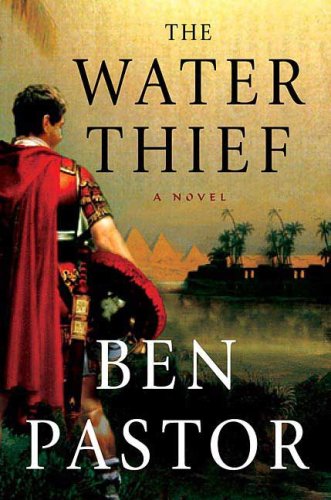
Thoth begins the Weighing of the Heart ceremony as Osiris asks who this person is who seeks admittance to his realm. In the midst of the solemn proceedings there is a loud banging at the portal and Anubis announces that someone has arrived to offer his own heart in exchange for the emperor's heart, so that Hadrian might live and walk the earth again. That person is standing unseen just outside the portal. After brief discussion, the Egyptian deities acknowledge that the Law of Maat specifically envisions such an exchange and that, indeed, it is the most sacred and powerful of covenants — surrendering one's own heart on the Scales of Truth for that of a loved one. Such love cannot be denied. The offer cannot be denied.
Genesthoi — So It Be It Done!
Back at the death bed in the Hermopolis villa, Hadrian gasps suddenly and his eyelids fly open, to the amazement of everyone who thought he had just expired. Sensing what has happened, he speaks hoarsely of a vivid dream involving deities. He looks around and demands to know where Antinous is.
"Where is he? What have you done with him? I know he would be here at my side if he were physically able. Bring him to me at once!"
But as Sabina and Lucius stammer excuses, and before the runners can summon Antinous, a boat crewman bursts into the room with the news that Antinous is missing and presumed to have drowned in the Nile.
Hadrian suffers a relapse, but the Egyptian magic is well done — he cannot die at this time. As the search for Antinous continues, with hope waning each day, Hadrian retreats to the rooftop observatory of the villa in Hermopolis which has been placed at his disposal by a wealthy Hermopolite. The emperor stares into the heavens night after night, refusing to give up hope that Antinous might yet be alive, perhaps dazed and confused and lost somewhere along the river.
Then one night he looks into the heavens and sees the proof that he has been looking for since the disappearance of Antinous. He summons the empress and Lucius and the entire court and also calls for the chief astrologer of the Temple of Thoth in Hermopolis to come quickly.
He informs them that a new star has appeared in the heavens and that it is a celestial sign that Antinous has left this earthly existence to ascend to the pantheon of the gods. He has surrendered everything on behalf of his beloved emperor, just as he had always said he would. Everyone thinks Hadrian has suffered another relapse and is delusional with fever. But the astronomer arrives and swiftly confirms that the sharp-eyed emperor has indeed discovered an uncharted star.
As Hadrian leaves to issue orders for the deification of Antinous, construction of the city and erection of temples throughout the world, the astronomer remains behind in the rooftop observatory with the wealthy owner of the house. Where precisely is this new star, the owner asks. "I know quite a bit about the stars for an amateur, but I can't for the life of me see anything at the spot in the heavens where Caesar was pointing just a while ago."
The astronomer says that the new star is definitely there and that astronomers throughout the world will confirm its existence and it will be recorded duly in all the star charts.

"Yes, but can't you point it out to me?" the wealthy man pleas. "I'm straining my eyes looking, but I just can't see anything."
The astronomer answers, "And that is why you will never be a good astronomer. You scan the heavens with your eyes, but not with your heart."
Without Antinous to serve as mediator, the Jewish crisis escalates into all-out rebellion, resulting in the destruction of Jerusalem by Hadrian's legions.
The novel ends with Hadrian seated at his villa outside Rome several years later. Sick and dying (this time for real), he is in an agony of pain both physical and emotional, just as he has been ever since Antinous left him. With difficulty, he raises himself from his chair and shuffles towards a stunningly beautiful new statue of Antinous which has just arrived and been set up in his study.
Hadrian examines it with weary eyes and runs his trembling fingers over the face.
"You loved me as no other," he whispers. "Selflessly and unconditionally, making no demands upon me. I never fully appreciated you during your brief life. I had too little time. Gave you too little love. Made too many demands. Was always too impatient with you. Too little time. All too brief. And now all we had is over and gone forever. If only you would look at me once more and smile the way you used to smile, with that smile that was meant only for me. If only you would tell me once more how much you love me. If only you would give me one last kiss, one last bit of solace."
But the benign countenance on the statue's face remains fixed and unaltered, the cold and baleful eyes gazing languidly at some indefinite point beyond the emperor.
Hadrian shuffles back to his chair and sighs in grief as he sits down stiffly with one last glance at the statue in the flickering lamp light.
Okay, so Ernst Sommer's novel "Antinous" is lousy history. Antinous died in October of 130 and the star was not discovered until January of 132. And there's no indication that Antinous ever served as a mediator with the rebellious Jews.
The book is good fiction, however. And it is a fascinating interpretation of the Hadrian/Antinous relationship — as it might possibly have been. Sadly, it has never been translated into English.
Hadrian had everything — unlimited power and boundless riches. But he lost the love of his life. He deified the love of his life and placed Antinous in the heavens so that we would remember H.I.M. every time we look up.
Let us remember the Divine Hadrian on his birthday.

A bomb was found in a church in Upper Egypt as Coptic Christians celebrated Christmas following a New Year's Day car-bombing that killed 21 churchgoers in Alexandria. The car-bombing prompted riots by Copts and worldwide condemnation amid fears that the Copt/Moslem clashes could destabilize Egypt. The latest nail bomb was at the bottom of a staircase in a church in the southern city of El-Minya — only a short distance from the ruins of the Sacred City of Antinoopolis.
The region has always been a hotbed of political and religious turmoil, dating back thousands of years. Indeed, the "heretic" Pharaoh Akhenaten's fabled "City of the Horizon" Akhetaten is also located here. Religious fanaticism and strife are a blood-drenched tradition along this stretch of the Nile between El-Minya and Asyut. Tourists are whisked in and out of Akhetaten in buses escorted by armed police. The ruins of Antinoopolis are off limits to tourists, partly due to the volatile political and religious situation.
The precautions are not unwarranted. Just a few months ago, Islamic Fundamentalists abducted Coptic monks from a monastery only a few kilometers away from the site of our Sacred City. The Islamic radicals accused the monks of seeking to spread Christianity by expanding their monastery compound. Riot troops were called in to resolve the hostage-taking.
As Sacred Synchronicity would have it, today is the date the Religion of Antinous commemorates a similar Massacre of Christians at Antinoopolis. But a closer look reveals that the Religion of Antinous and early Christianity were subject to much exchange of concepts. Antinous was the last pagan god of the Classical age, and his priests were contemporaries of the early Christians, who were squabbling among themselves over how to present the story of their own fallen young Man-God, the slain Jesus of Nazareth.
It was on January 8th during the persecutions of Diocletian in the year 286 AD that St. Anthony, St. Anastasius, St. Vasilissa, St. Celsus, St. Marcionilla, St. Julian, seven children, and 20 soldiers were all put to death at Antinoopolis for being Christians.
Because their deaths took place in our Sacred City Antinoopolis, we honor their memory and courage in the face of ignorance and violence.
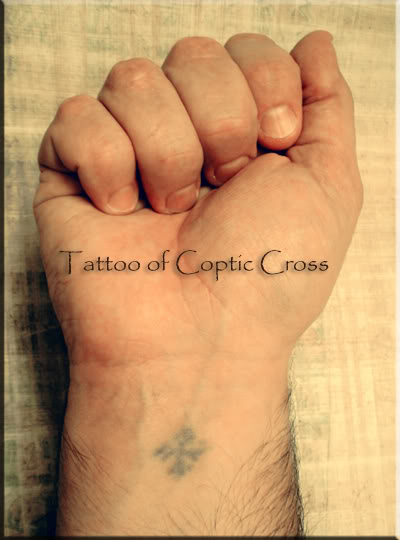
EL-MINYA, EGYPT, JAN. 13 — An off-duty police officer boarded an Asyut-Cairo train near El-Minya in Egypt Tuesday and opened gunfire on Christians, killing one Coptic Christian and wounding five others — four women and a man. The gunman, who was wearing his police uniform, entered one of the passenger carriages and singled out Christians by checking their wrists for the characteristic tattoo. Copts receive a tattoo of a cross on their right inside wrists upon baptism to show their commitment to Christ. The tattoo is also believed to afford magical protection from evil — in keeping with Ancient Egyptian belief in sacred magical symbols. Later, eyewitnesses said hundreds of Copts rallied outside the local hospital, where the wounded had been taken, and clashed with police, who fired tear gas to disperse them. In Cairo, meanwhile, hundreds of Christians clashed with more than 1,000 riot police, pelting officers with rocks and bottles.
The story of Antinous the Gay God is the story of the clash between the last of the Greco-Roman pagans and the earliest of the Christians. The two religions borrowed heavily from each other. They lived side-by-side in the cradle of the Nile. Christians lived in the Sacred City of Antinoopolis and initially were subjected to cruel abuse by pagans — before they finally got the upper hand and cruelly suppressed the pagans.
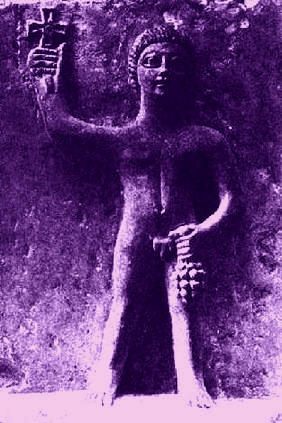
A stone relief (at right) depicts a Antinous-Dionysus holding a Coptic cross in one hand and a bunch of Bacchanalian grapes in the other. Only the hair style reveals that this is supposed to be Antinous and not Jesus.
And, like modern-day Christians and Moslems, the followers of these competing religions waged ideological campaigns to portray their rivals as lost souls.
The homophobic hysteria of many modern-day Christians can be traced directly back to the grim determination of those earliest Christians to distance themselves from the popular cult of the beautiful Man-God Antinous who, like Jesus, held out the prospect of salvation to his followers.
Those earliest Christians went to great lengths to portray the Gay God as a demon and as Satan incarnate. They very literally "demonized" Antinous and condemned his followers as devil-worshippers. Later, when Islam replaced Christianity in Egypt, the anti-homosexual prejudices were retained.
Thus, this is the story of the religion-fired hatred that has led to so much suffering for gay men and lesbians throughout history. To understand Antinous is to understand why many Christians and Moslems to this very day are staunchly convinced that homosexuals are possessed by a demon or by Satan. What they sense in us is in fact Antinous the Gay God.
So the story of Antinous is the story of all gays. It is the story of you and me. And that means that the story does not start on the banks of a great river on the edge of the desert, it starts instead with the place where you were born, because the legacy of Antinous has in part shaped your life.
Each of you is a Priest of Antinous...of an ancient cult that was destroyed...and has remained dead...and is now reborn...in us...because we love him...and we want to raise his memory from the dead. There has been no cult of Antinous for 1,900 years, not a single priest.
The magnificent Religion of Antinous was dead.
And though there have been a few here and there who over the centuries have claimed to be priests and have been devoted to him for decades, none of these have loved him with enough passion to refound his cult. None came forth and said that the deification of Antinous was true or stood up and proclaimed "I beleve in Antinous."
But now we have. And more than that, we don't just say that we believe in Antinous and that his deification is true. We have adopted the cause which Hadrian proclaimed to the world. We identify ourselves as the successors of the ancient Priesthood of Antinoopolis, the sacred city founded on the banks of the Nile where Antinous drowned. We are not a new religion. We are the same religion that worshipped Antinous in Roman times.
The barbarians succeeded in putting us down. But our priestly predecessors loved Antinous so deeply and had so much faith in him that they carefully buried their treasures in the ground where he would be safe until the fires had burned over.
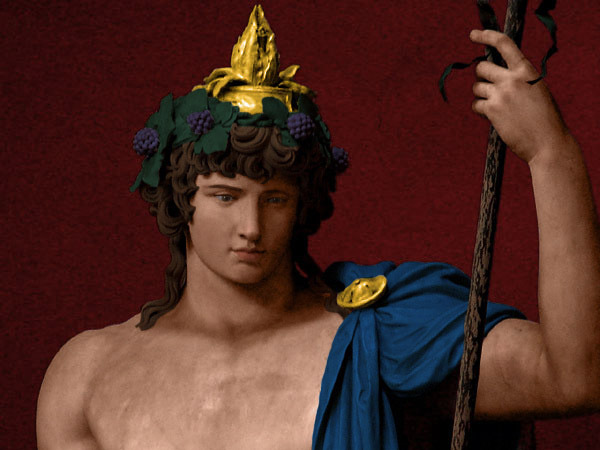
Thousands of statues and busts of Antinous have been dug up over the centuries — more than for any other Classical deity. And when those statues were dug up, the power came out of the ground and began to work its way in the world.
We are that power. You are that power. The power is ignited in us. Even if you have never heard of Antinous before this moment, he has always lived within your heart.
I once asked Flamen Antinoalis Antonius Subia what made him certain I was worthy to be a priest of Antinous. He told me:
"You are a Priest of Antinous. For there is one qualification you have, the most important and sacred of all your personal attributes...that you are a homosexual.
"That is why you are worthy to be a Priest of Antinous. You can't change the fact that you are gay, it wasn't your choice, and you would never consider changing your sexuality even if you could.
"You will always be a homosexual, because Antinous made you gay."
Those are words which are worth repeating aloud to all followers of Antinous the Gay God. He selected us from all others. Every gay boy has felt this touch of specialness. We have felt it all our lives. Our Homosexuality is Sacred. Antinous is the Man-God within us. And we are Antinous the Gay God.
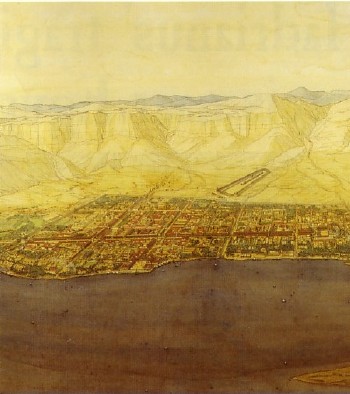
So we pause this week to condemn the very sort of religious intolerance which bedeviled our own Sacred City in ancient times — and which continues to bedevil it even today.
Flamen Antinoalis Antonius Subia explains this seemingly contradictory stance: "The Religion of Antinous condemns the persecutors for the murder of innocents, and begs forgiveness for the cruelty of our ancient citizens and for the negligence of the ancient priests. We dedicate this day, on which these souls were martyred for Christ as an occasion of shame and sorrow, and as a reminder that we must never persecute our human brothers and sisters.
"In our love for Antinous, we pray for the holy and consecrated souls of these martyrs who died in our Holy City because they would not honor our gods. Intolerance in all forms is the final restraint that holds Antinous prisoner in our cosmos. The final three days before the liberation of Antinous the God, is sacred to the Holy Christian Martyrs of Antinoopolis, whose forgiveness we seek for our own liberation."

This liberation is commemorated on January 11th, the Feast Day of the completion of Antinous' mummification, following his death in the Nile in October. Antinous in glory and radiance, stands between our cosmos and the abyss that is known as the Veil. He has returned as Antinous the Savior.
Then on January 12th Antinous the Transfigured becomes Antinous Navigator. Antonius Subia says, "Antinous steps away and The Boat of Millions of Years in One Moment, leaves the shore of the known cosmos, sailing out into the darkness of the abyss on its voyage to the Black Star, the way of the void, where the heaven of Antinous lies concealed beyond the veil of the cloud of unknowing, where he enters the fullness of the Place of Light, and restores the unity of the Aeons. This is the Via Negativa whereupon the soul-triumphant is lost in the open space of nonbeing, awaiting the Dark Bird of Night, the Thunderbird-Phoenix-Eagle that will elevate his heroic spirit to immortality. Only Antinous can guide the Boat of Millions of Years across this expanse of darkness. This journey, which ends as it begins, which arrives as it departs, is the eternal heaven which Antinous has accomplished for all those who are his chosen, who answer his call, and who believe in him."
But what has any of this to do with us as gay men living in the 21st Century? If there is a God of the Gays, then why does he let us suffer?
It is so hard to see any divine plan in our everyday lives. We seem to be so powerless, so very much at the mercy of merciless powers which are oblivious to our wishes or our needs. We look at those glistening eyes of Antinous and wonder — does he care? Why does he let bad things happen to those who love him?
And yet ... and yet ... there are those moments which make us realize there just might be a Divine Plan after all and that Antinous does care.
He is so mysterious. He is so unapproachable. The OBELISK OF ANTINOUS says he works miracles. It says he brings healing dreams to us as we sleep. But so often we wake up the morning and our troubles weigh upon us worse than they did the night before.
And yet ... and yet ... there are those moments when we feel his gentle hand and we know he has moved and acted on our behalf — perhaps not in any way which we could possibly have anticipated. Not in the way we had necessarily hoped. But in a way which amazes us with its sublimely mysterious logic.
Usually, it is when we have given up hope that Antinous steps in and does his mysterious thing. The more we try to hold on and to control the situation, the more oblivious he seems. And yet ... and yet ... when we just give up and let go, he does his mysterious thing.

For many of us, trying to maintain control in our lives is a bit like trying to maintain control on a roller-coaster. The ride has its own mysterious logic and is going to go its own way, regardless of how tightly you grip the bar.
There is a thrill and a power in simply surrendering to the ride and fully feeling the ups and downs of it, letting the curves take you rather than fighting them.
When you fight the ride, resisting what's happening at every turn, your whole being becomes tense and anxiety is your close companion. When you go with the ride, accepting what you cannot control, freedom and joy will inevitably arise.
As with so many seemingly simple things in life, it is not always easy to let go, even of the things we know we can?t control. Most of us feel a great discomfort with the givens of this life, one of which is the fact that much of the time we have no control over what happens.
Sometimes this awareness comes only when we have a stark encounter with this fact, and all our attempts to be in control are revealed to be unnecessary burdens.
But we can also cultivate this awareness in ourselves gently, by simply making surrender a daily practice. At the end of our meditation, we might bow, saying, "I surrender this life and place myself in the hands of Antinous." This simple mantra can be repeated as necessary throughout the day, when we find ourselves metaphorically gripping the safety bar.
We can give in to our fear and anxiety, or we can surrender to this Great Mystery with courage. We thus banish all fear and all doubt from our hearts.
When we see people on a roller-coaster, we see that there are those whose faces are tight with fear and then there are those who smile broadly, with their hands in the air, carried through the ride on a wave of freedom and joy. This powerful image reminds us that often the only control we have is choosing how we are going to respond to the ride.
And that is the moment — when our hearts are free of fear and doubt — when Antinous can step into our hearts and do his mysterious thing. When we stop struggling and white-knuckling the bar, and when we just give up and just let go ....
Perhaps we shouldn't try so hard to understand the God's mysterious ways. Perhaps we should just accept that his ways are mysterious. There is an Ancient Egyptian inscription (stolen by the Hebrews) which says:
"For the God's thoughts are not the thoughts of us mortals, neither are the God's ways the ways of us mortals."
As we look back over the past year, perhaps the ultimate New Year's message to us from Antinous the Gay God is:
"My ways are mysterious. Get used to it!"
This week marks the Coming Forth by Day of Antinous. His triumph becomes the celestial procession, and together with the saints and blessed spirits of the immortals and divinized men, Antinous steps away from the limit of the cosmos and enters the darkness of the void beyond, becoming his own divine navigator.
It is only by letting go that we open our hearts to the Gay Spiritual Liberation that Antinous the Gay God offers us with all his heart. We stop struggling and we stop despairing at our lack of control. We stop trying to control the course of the roller-coaster and, instead, we just sit back and enjoy the thrills and spills. We stand proudly and contentedly beside the portals of our Spiritual Home within the Sacred City of Antinoopolis.
2012 ANTINOOPOLIS GAYZETTE EDITIONS
2010 ANTINOOPOLIS GAYZETTE EDITIONS